Fundamental Constitutions of Carolina (1681)
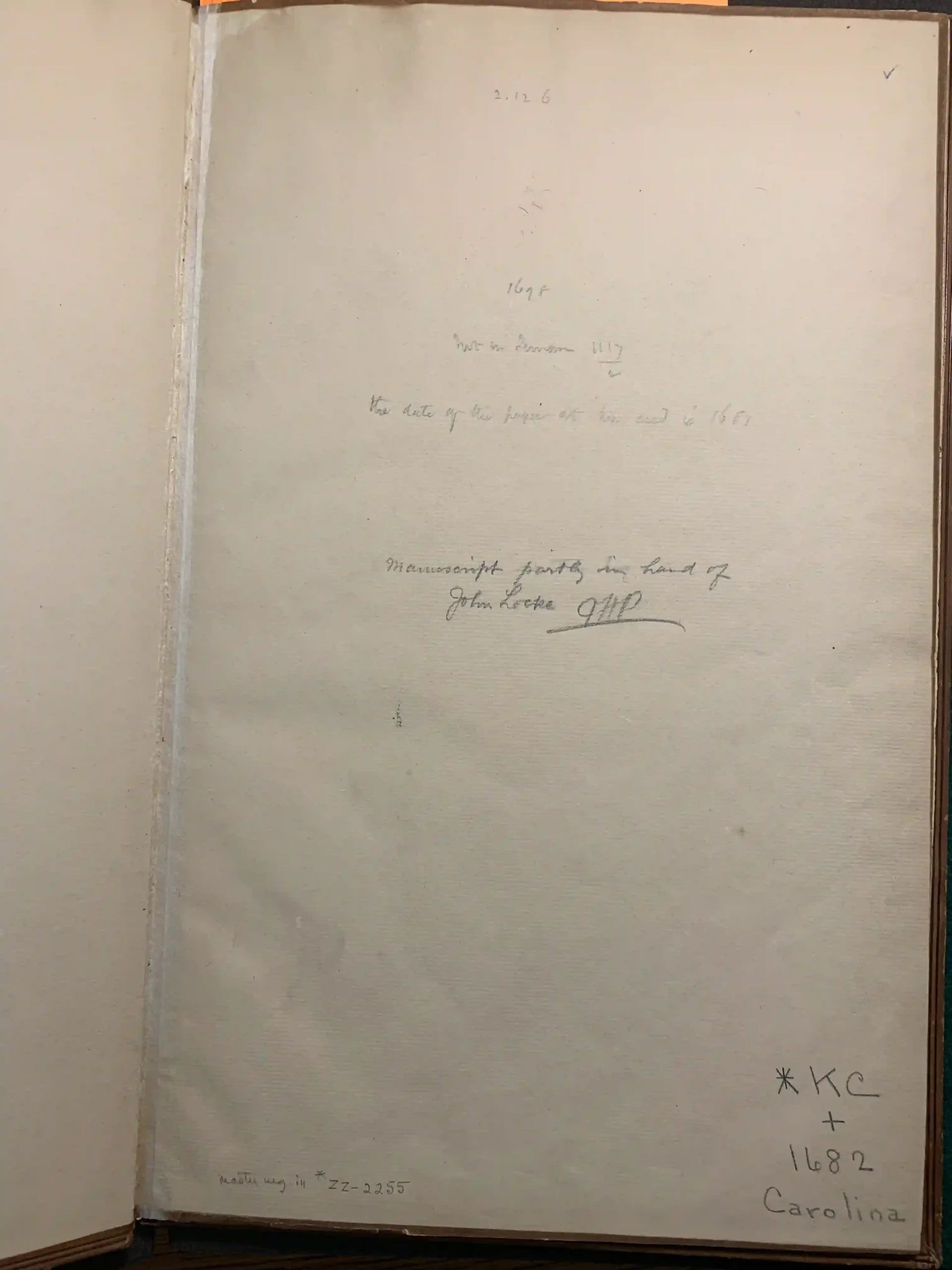
[Editor’s Note: The notes in this page are in modern pencil]
1678
[[unclear]]
the date of the paper at the end is 1681
Manuscript partly in hand of
John Locke JHP
*KC
+
1682
Carolina
[Editor’s Note: call number for New York Public Library]
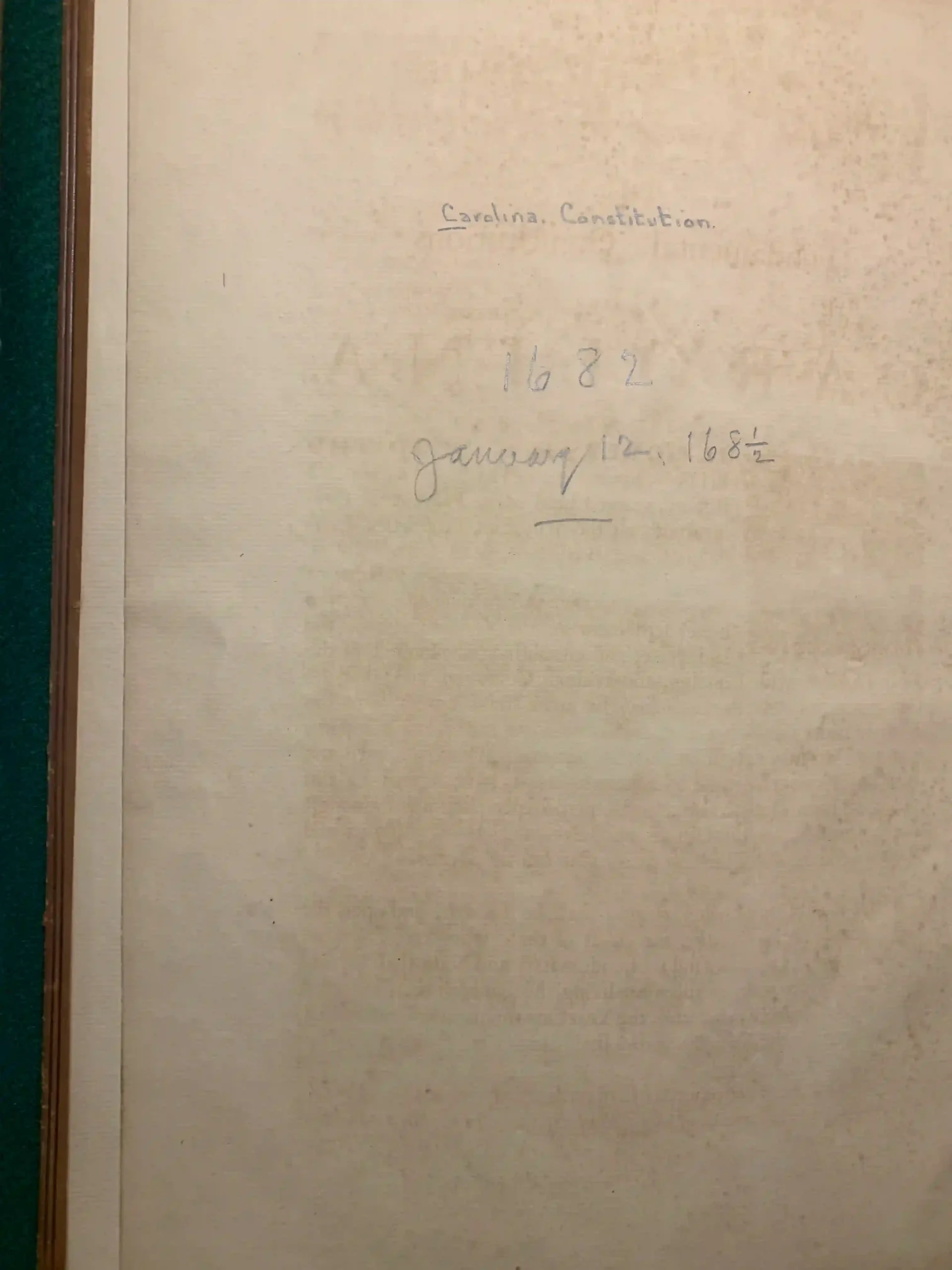
Carolina Constitution.
1682
January 12, 1681/2
[Editor’s note:
[1] The publication and the marginalia in this document are from before this penciled date, since it is a printed version with marginalia for revisions meant to be signed on January 12, 1681/2 once all of the corrections are made (as is clear from the final pages). Marginalia on the side and in the interleafed folios was probably made in 1681, but no dates are given. The better date for the marginalia and the printing of this document is therefore 1681.
[2] Some of the marginalia appears to be in the hand of John Locke, with comments mostly related to the appointment and removal of Palatine’s deputies and about marriages. Such marginalia are indicated as probably by Locke, where they appear.]

The
Fundamental Constitutions
of
CAROLINA
OUR SOVERAIGN LORD THE
KING having out of his Royal Grace and
Bounty, granted unto us the Province of Caro-
lina, with all the Royalties, Properties, Juris-
dictions, and Priviledges of a County Palatine,
as large and ample as the County Palatine of
Durham, with other great Priviledges; for the
better settlement of the Government of the
said place, and establishing the Interest of the
Lords Proprietors with Equality, and without Confusion, and that the
Government of this Province may be made most agreeable to the
Monarchy under which we live, and of which this Province is a part;
and that we may avoid erecting a numerous Democracy, we the
Lords and Proprietors of the Province aforesaid, have agreed to this
following Form of Government, to be perpetually established amongst
us, unto which we do Oblige our selves, our Heirs, Assignes and
Successors, in the most binding ways that can be devised.
§.1. THe eldest of the Lords Proprietors shall be Pallatine, and upon the
decease of the Pallatine, the eldst of those who were Proprietors
the first of March, One thousand six hundred sixty and Nine, shall succeed
him. And when none of them are living, he that hath been longest a
Proprietor shall succeed; but after the Year One thousand seven hundred, & the death of all &c who were Proprietors 1st of March 1669.
the eldest man of the then Lords Proprietors shall always be Pallatine.
There shall be seven other chief Offices erected, viz. The Admirals,
Chamberlains, Chancellors, Constables, Chief Justices, High Stewards, and

2
Treasurers; which places shall be enjoyed by none but the Lords Pro-
prietors; to be assigned at first by Lott, and upon the Vacancy of any
one of the seven great Offices by death or otherwise, the eldest of those
who were Proprietors the first of March One thousand six hundred sixty
and Nine, shall have his choyce; and when none of them are living, he
that hath been longest a Proprietor shall have his choyce: But after the
Year One thousand seven hundred, if none of those that were Proprietors
in the Year One thousand six hundred sixty and Nine, are then living,
the eldest man of the then Lords Proprietors shall have his choyce.
§. 3. The whole Province shall be divided into Counties; each County
shall consist of eight Signiories, eight Baronies, and four Precincts; each
Precinct shall consist of six Colonies.
§. 4. Each Signiory, Barony, and Colony, shall consist of twelve thousand
Acres, the eight Signiories being the Share of the eight Proprietors,
and the eight Baronies of the Nobility, both which Shares being each
of them one fifth part of the whole, are to be perpetually annexed,
the one to the Proprietors, the other to the hereditary Nobility, leaving
the Colonies, being three Fifths, amongst the People; that so in Set-
ting out, and Planting the Lands, the Ballance of the Government
may be preserved.
§. 5. At any time before the Year One thousand seven hundred and
one, any of the Lords Proprietors shall have power to Relinquish, Alie-
nate, and Dispose to any other Person, his Proprietorship, and all the
Signiories, Powers, and Interest thereunto belonging, wholly and in-
tirely together, and not otherwise. But after the year One thousand
seven hundred, those who are then Lords Proprietors, shall not have
power to Alienate or Make over their Proprietorship, with the Signiories
and Priviledges thereunto belonging, or any part thereof, to any
person whatsoever, otherwise than as in §.17 18. but it shall all descend
unto their Heirs Male; and for want of Heirs Male, it shall all descend
on that Landgrave or Cassique of Carolina, who is Descended of the
next Heir Female of the said Proprietor; and for want of such Heirs,
it shall descend on the next Heir general; and for want of such Heirs,
the remaining seven Proprietors shall upon the Vacancy, chuse a Land-
grave to succeed the deceased proprietor, who being chosen by the
majority of the seven surviving proprietors, he and his Heirs successive-
ly shall be proprietors, as fully to all intents and purposes as any of
the rest.
§.6. That the number of eight proprietors may be constantly kept; if
upon the vacancy of any proprietorship, the seven surviving proprietors
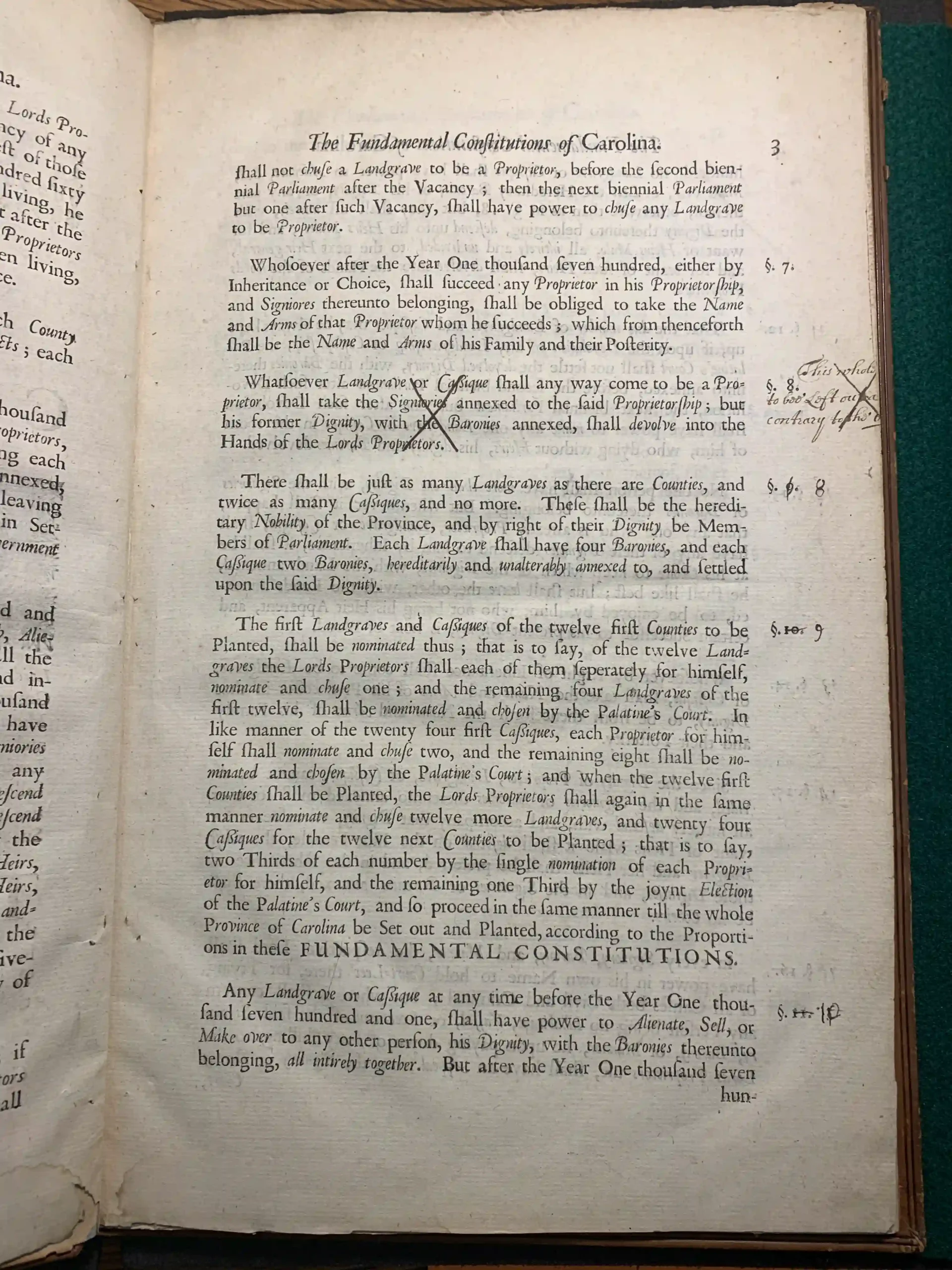
3
shall not chuse a Landgrave to be a Proprietor, before the second bien-
nial Parliament after the Vacancy; then the next biennial Parliament
but one after such Vacancy, shall have power to chuse any Landgrave
to be Proprietor.
§. 7. Whosoever after the Year One thousand seven hundred, either by
Inheritance or Choice, shall succeed any Proprietor in his Proprietorship,
and Signiores thereunto belonging, shall be obliged to take the Name
and Arms of that Proprietor whom he succeeds; which from thenceforth
shall be the Name and Arms of his Family and their Posterity.
§. 8. This whole to bee left out as contrary to the [?] Whatsoever Landgrave or Cassique shall any way come to be a Pro-
prietor, shall take the Signiories annexed to the said Proprietorship; but
his former Dignity, with the Baronies annexed, shall devolve into the
Hands of the Lords Proprietors.
§.9. 8. There shall be just as many Landgraves as there are Counties, and
twice as many Cassiques, and no more. These shall be the heredi-
tary Nobility of the Province, and by right of their Dignity be Mem-
bers of Parliament. Each Landgrave shall have four Baronies, and each
Cassique two Baronies, hereditarily and unalterably annexed to, and settled
upon the said Dignity.
§.10. 9 The first Landgraves and Cassiques of the twelve first Counties to be
Planted, shall be nominated thus; that is to say, of the twelve Land-
graves the Lords Proprietors shall each of them seperately for himself,
nominate and chuse one; and the remaining four Landgraves of the
first twelve, shall be nominated and chosen by the Palatine`s Court. In
like manner of the twenty four first Cassiques, each Proprietor for him-
self shall nominate and chuse two, and the remaining eight shall be no-
minated and chosen by the Palatine`s Court; and when the twelve first
Counties shall be Planted, the Lords Proprietors shall again in the same
manner nominate and chuse twelve more Landgraves, and twenty four
Cassiques for the twelve next Counties to be Planted; that is to say,
two Thirds of each number by the single nomination of each Propri-
etor for himself, and the remaining one Third by the joynt Election
of the Palatine`s Court, and so proceed in the same manner till the whole
Province of Carolina be Set out and Planted, according to the Proporti-
ons in these FUNDAMENTAL CONSTITUTIONS.
§.11. 10 Any Landgrave or Cassique at any time before the Year One thou-
sand seven hundred and one, shall have power to Alienate, Sell, or
Make over to any other person, his Dignity, with the Baronies thereunto
belonging, all intirely together. But after the Year One thousand seven

4
hundred, no Landgrave or Cassique shall have power to Alienate, Sell,
Make over, or Lett the Hereditary Baronies of his Dignity, or any part
thereof, otherwise than as in §. 18, but they shall all intirely, with
the Dignity thereunto belonging, descend unto his Heirs Males; and for
want of Heirs Male, all intirely and undivided, to the next Heir general;
and for want of such Heirs, shall devolve into the Hands of the Lords
Proprietors.
11 §.12. That the due number of Landgraves and Cassiques may be always kept
up, if upon the Devolution of any Landgraveship or Cassiqueship, the Pa-
latine’s Court shall not settle the devolved Dignity, with the Baronies there-
unto annexed, before the second biennial Parliament after such Devo-
lution, the next biennial Parliament but one after such Devolution
shall have power to make any one Landgrave or Cassique in the room
of him, who dying without Heirs, his dignity and Baronies devolved.
12 §.13. No one person shall have more than one Dignity, with the Signiories
or Baronies thereunto belonging. But whensoever it shall happen,
that any one who is already Proprietor, Landgrave or Cassique, shall
have any of these Dignities descend to him by Inheritance, it shall be
at his Choice to keep which of the Dignities, with the Lands annexed,
he shall like best; but shall leave the other, with the Lands annex-
ed, to be enjoyed by him, who not being his Heir Apparent, and
certain Successor to his present Dignity, is next of Blood.
13 §.14. Whosoever by Right of Inheritance shall come to be Proprietor Landgrave,
or Cassique, shall take the Name and Arms of his Predecessor in that
Dignity, to be from thenceforth the Name and Arms of his Family
and their Posterity.
14 §.15. Since the Dignity of Proprietor, Landgrave, or Cassique, cannot be di-
vided, and the Signiories or Baronies thereunto annexed must for ever
all intirely descend with, and accompany that Dignity, whensoever for
want of Heirs Male it shall descend on the Issue Female, the eldest
Daughter and her Heirs shall be preferred, and in the Inheritance of
those Dignities, and in the Signiories or Baronies annexed, there shall
be no Coheirs.
15 §.16. In every Signiory, Barony, and Mannor, the respective Lord shall
have power in his own Name to hold Court-Leet there, for Trying
of all Causes both Civil and Criminal; but where it shall concern
any Person being no Inhabitant, Vassal, or Leet-man of the said Signio-
ry, Barony, or Mannor, he upon paying down of forty Shillings to the
Lords Proprietors use, shall have an Appeal from the Signiory or Barony
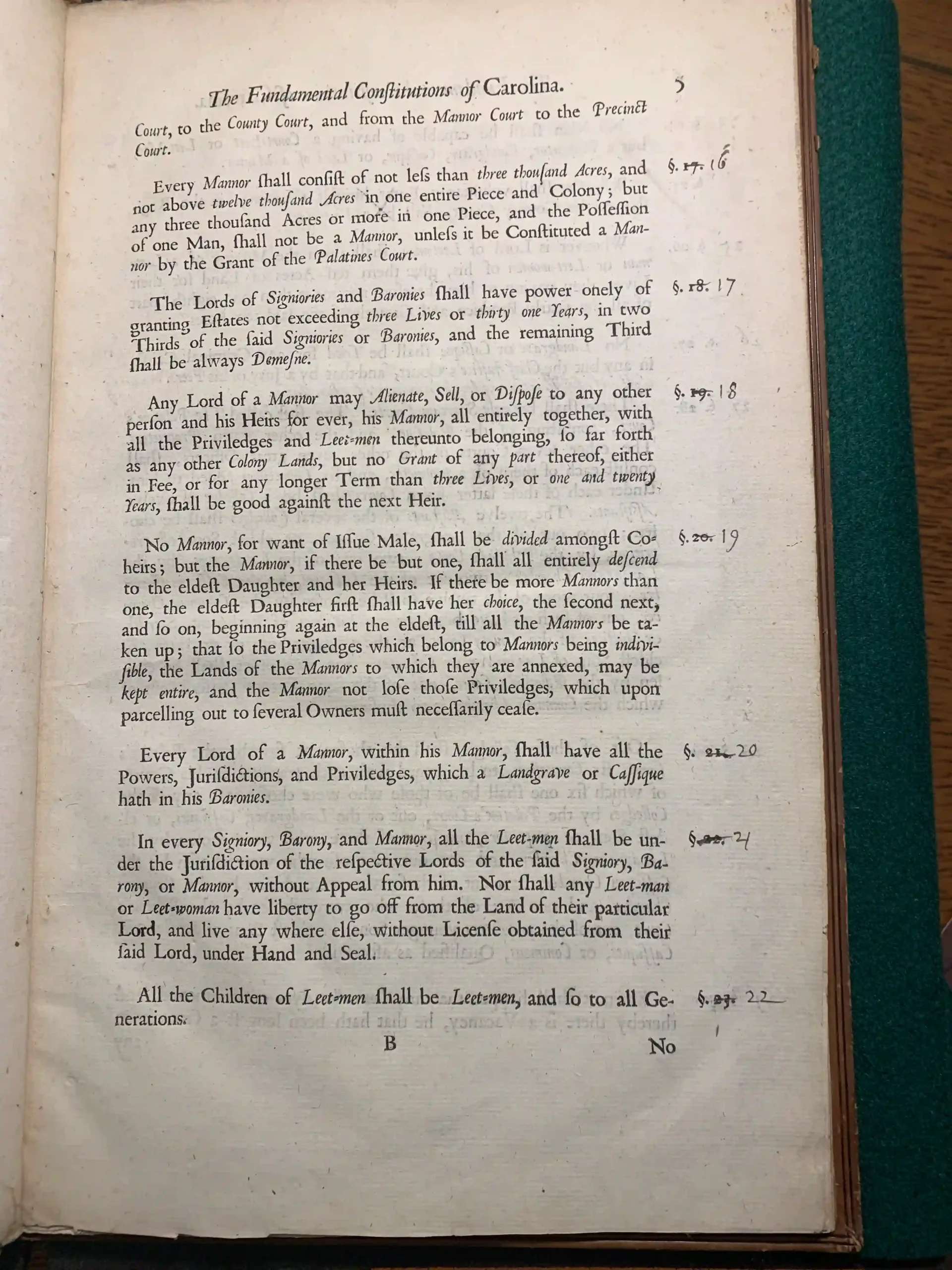
5
Court, to the County Court, and from the Mannor Court to the Precinct
Court.
§.17. 16 Every Mannor shall consist of not less than three thousand Acres, and
not above twelve thousand Acres in one entire Piece and Colony; but
any three thousand Acres or more in one Piece, and the Possession
of one Man, shall not be a Mannor, unless it be Constituted a Man-
nor by the Grant of the Palatines Court.
§.18. 17 The Lords of Signiories and Baronies shall have power onely of
granting Estates not exceeding three Lives or thirty one Years, in two
Thirds of the said Signiories or Baronies, and the remaining Third
shall be always Demesne.
§.19. 18 Any Lord of a Mannor may Alienate, Sell, or Dispose to any other
person and his Heirs for ever, his Mannor, all entirely together, with
all the Priviledges and Leet-men thereunto belonging, so far forth
as any other Colony Lands, but no Grant of any part thereof, either
in Fee, or for any longer Term than three Lives, or one and twenty
Years, shall be good against the next Heir.
§.20. 19 No Mannor, for want of Issue Male, shall be divided amongst Co-
heirs; but the Mannor, if there be but one, shall all entirely descend
to the eldest Daughter and her Heirs. If there be more Mannors than
one, the eldest Daughter first shall have her choice, the second next,
and so on, beginning again at the eldest, till all the Mannors be ta-
ken up; that so the Priviledges which belong to Mannors being indivi-
sible, the Lands of the Mannors to which they are annexed, may be
kept entire, and the Mannor not lose those Priviledges, which upon
parcelling out to several Owners must necessarily cease.
§.21. 20 Every Lord of a Mannor, within his Mannor, shall have all the
Powers, Jurisdictions, and Priviledges, which a Landgrave or Cassique
hath in his Baronies.
§.22. 21 In every Signiory, Barony, and Mannor, all the Leet-men shall be un-
der the Jurisdiction of the respective Lords of the said Signiory, Ba-
rony, or Mannor, without Appeal from him. Nor shall any Leet-man
or Leet-woman have liberty to go off from the Land of their particular
Lord, and live any where else, without License obtained from their
said Lord, under Hand and Seal.
§.23. 22 All the Children of Leet-men shall be Leet-men, and so to all Ge-
nerations.
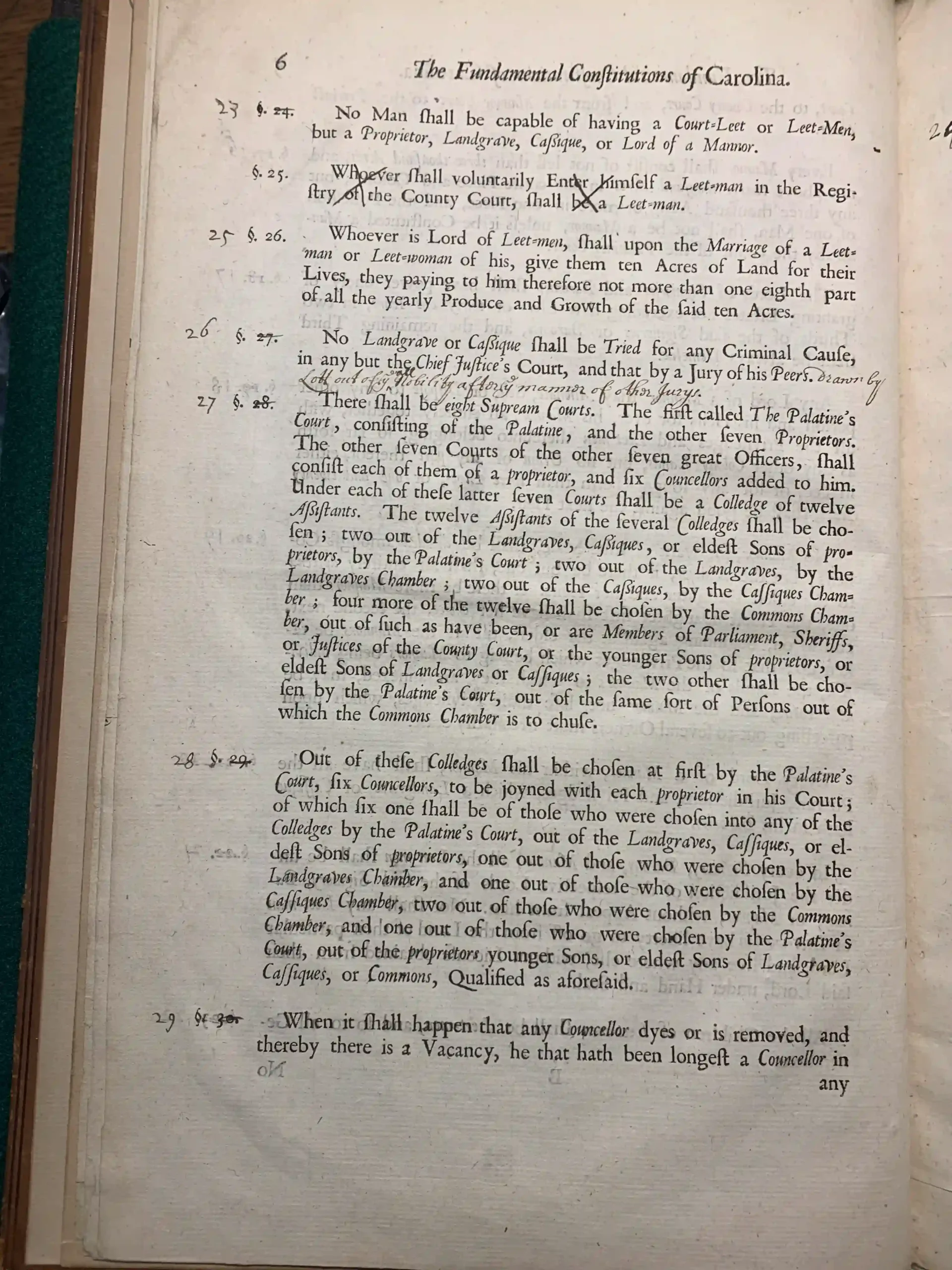
6
23 §.24. No Man shall be capable of having a Court-Leet or Leet-Men,
but a Proprietor, Landgrave, Cassique, or Lord of a Mannor.
§. 25. Whoever shall voluntarily Enter himself a Leet-man in the Regi-
stry of the County Court, shall be a Leet-man.
25 §. 26. Whoever is Lord of Leet-men, shall upon the Marriage of a Leet-
man or Leet-woman of his, give them ten Acres of Land for their
Lives, they paying to him therefore not more than one eighth part
of all the yearly Produce and Growth of the said ten Acres.
26 §.27. No Landgrave or Cassique shall be Tried for any Criminal Cause,
in any but the Chief Justice‘s Court, and that by a Jury of his Peers. drawn by Lott out of all Nobility after the manner of other Jurys.
27 §.28. There shall be eight Supream Courts. The first called The Palatine`s
Court, consisting of the Palatine, and the other seven Proprietors.
The other seven Courts of the other seven great Officers, shall
consist each of them of a proprietor, and six Councellors added to him.
Under each of these latter seven Courts shall be a Colledge of twelve
Assistants. The twelve Assistants of the several Colledges shall be cho-
sen; two out of the Landgraves, Cassiques, or eldest Sons of pro-
prietors; by the Palatine`s Court; two out of the Landgraves, by the
Landgraves Chamber; two out of the Cassiques, by the Cassiques Cham-
ber; four more of the twelve shall be chosen by the Commons Cham-
ber, out of such as have been, or are Members of Parliament, Sheriffs,
or Justices of the County Court, or the younger Sons of proprietors, or
eldest Sons of Landgraves or Cassiques; the two other shall be cho-
sen by the Palatine`s Court, out of the same sort of Persons out of
which the Commons Chamber is to chuse.
28 §.29. Out of these Colledges shall be chosen at first by the Palatine`s
Court, six Councellors, to be joyned with each proprietor in his Court;
of which six one shall be one of those who were chosen into any of the
Colledges by the Palatine`s Court, out of the Landgraves, Cassiques, or el-
dest Sons of proprietors, one out of those who were chosen by the
Landgraves Chamber, and one out of those who were chosen by the
Cassiques Chamber, two out of those who were chosen by the Commons
Chamber, and one out of those who were chosen by the Palatine`s
Court, out of the proprietors younger Sons, or eldest Sons of Landgraves,
Cassiques, or Commons, Qualified as aforesaid.
29 §.30. When it shall happen that any Councellor dyes or is removed, and
thereby there is a Vacancy, he that hath been longest a Councellor in
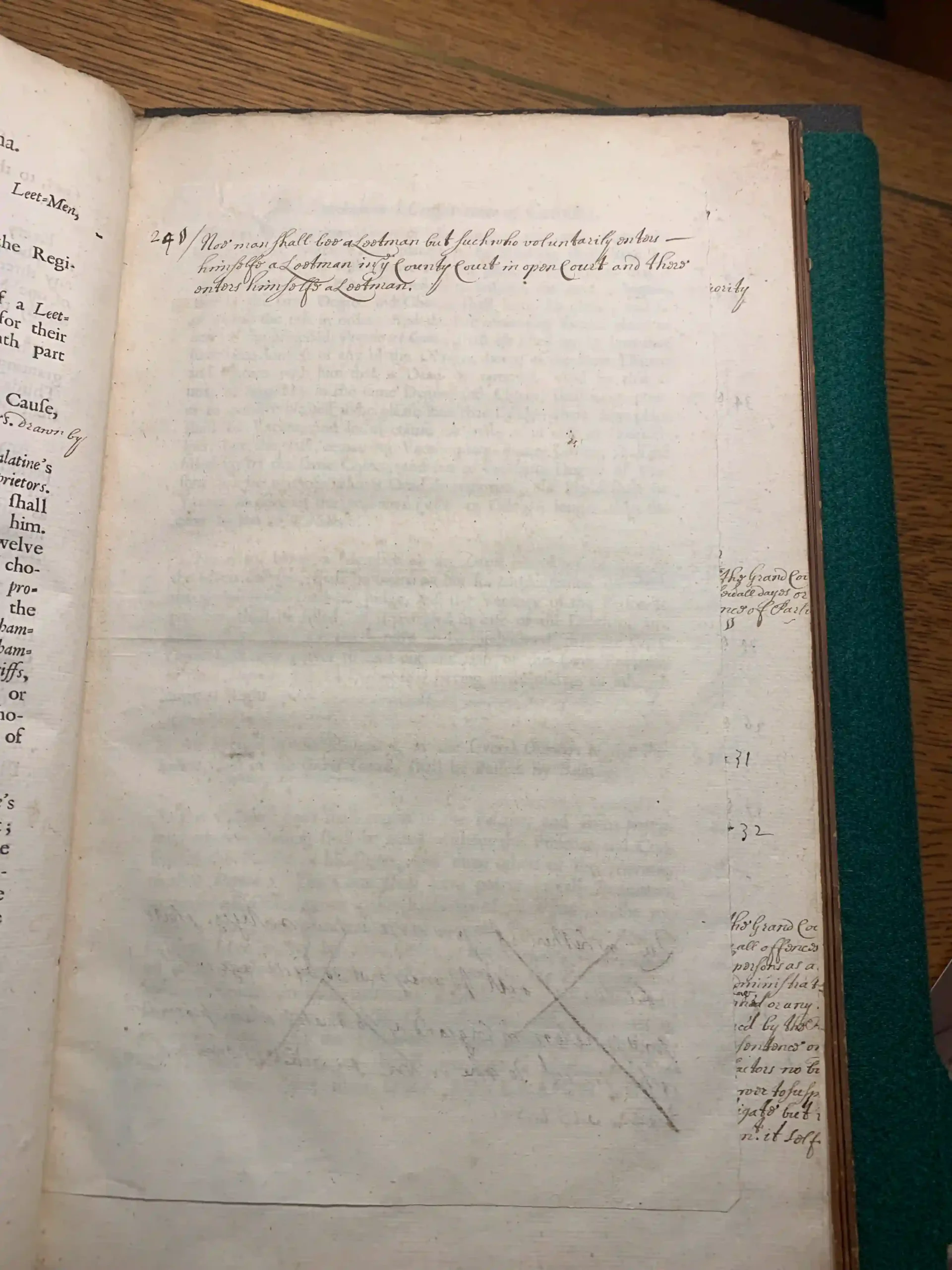
24 § / Noe man shall bee a Leetman but such who voluntarily enters
himselfe a Leetman in the County Court in open Court and there
enters himselfe a Leetman.
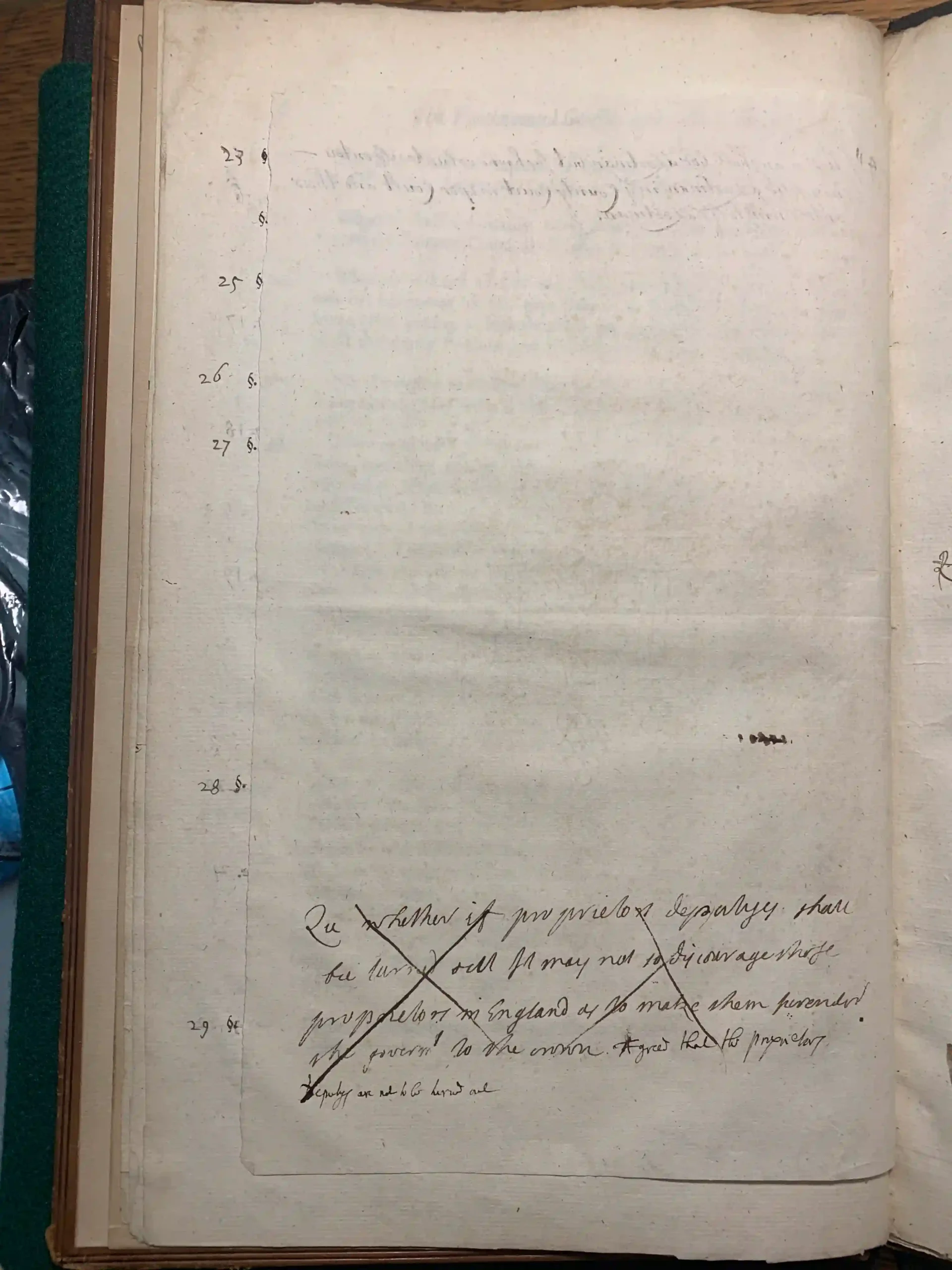
[Editor’s Comment: John Locke’s handwriting, likely]
Qu whether if proprietors deputyes shall
bee turned out It may not to discourage those
proprietors in England as to make them surender
the government to the crown. Agreed that the proprietors
Deputys are not to be turned out.
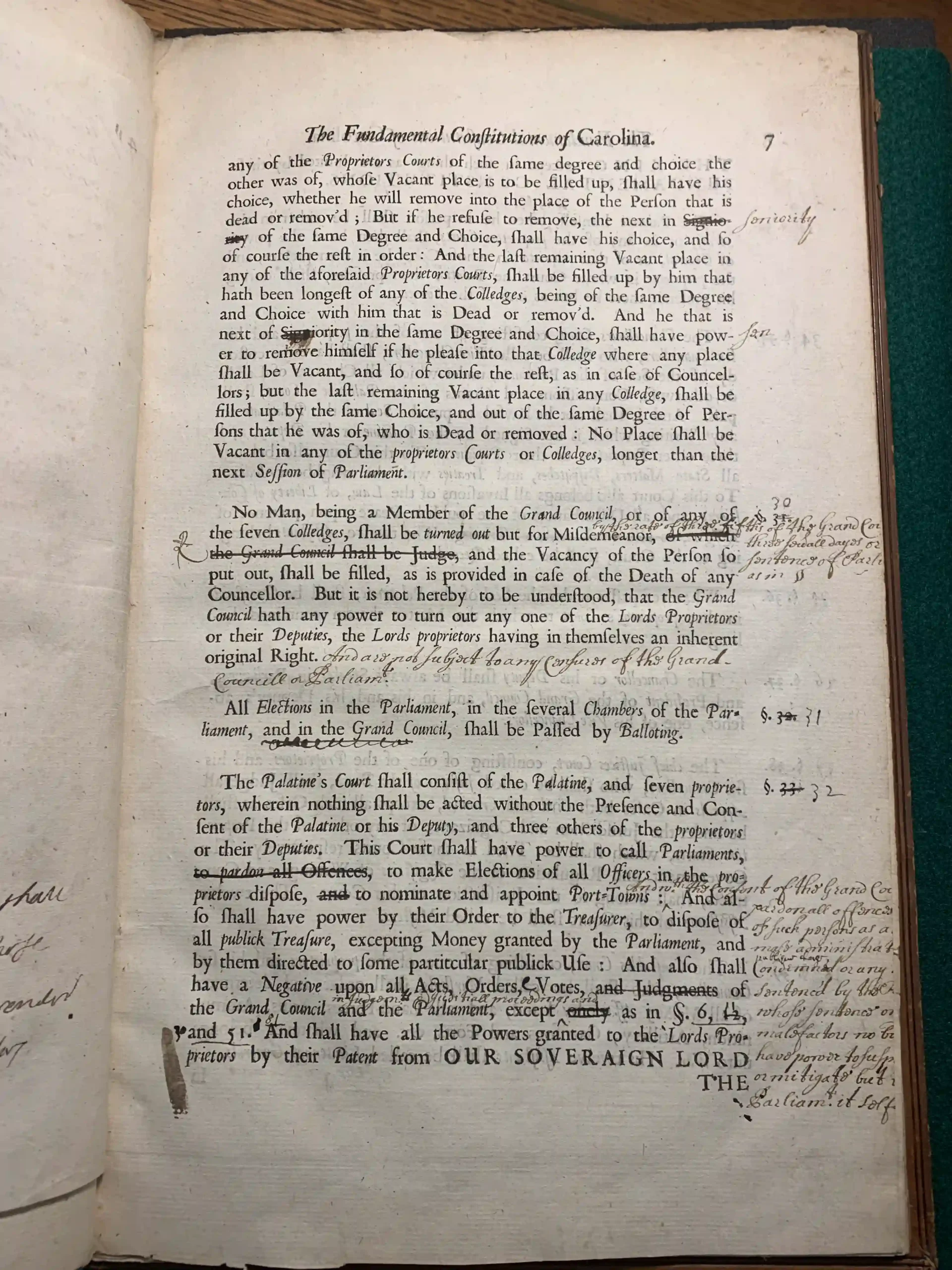
7
any of the Proprietors Courts of the same degree and choice the
other was of, whose Vacant place is to be filled up, shall have his
choice, whether he will remove into the place of the Person that is
dead or remov’d; But if he refuse to remove, the next in Signio- Seniority
rity of the same Degree and Choice, shall have his choice, and so
of course the rest in order : And the last remaining Vacant place in
any of the aforesaid Proprietors Courts, shall be filled up by him that
hath been longest of any of the Colledges, being of the same Degree
and Choice with him that is Dead or remov’d. And he that is
next of Signiority in the same Degree and Choice, shall have pow- {Sen.}
er to remove himself if he please into that Colledge where any place
shall be Vacant, and so of course the rest, as in case of Councel-
lors; but the last remaining Vacant place in any Colledge, shall be
filled up by the same Choice, and out of the same Degree of Per-
sons that he was of, who is Dead or removed : No Place shall be
Vacant in any of the proprietors Courts or Colledges, longer than the
next Session of Parliament.
§.31. 30 No Man, being a member of the Grand Council, or of any of
the seven Colledges, shall be turned out but for Misdemeanor, by the rate of three fifths of the Grand Court three severall dayes or sentence of Parliament as in § of which
the Grand Council shall be Judge, and the Vacancy of the Person so
put out, shall be filled, as provided in case of the Death of any
Councellor. But it is not hereby to be understood, that the Grand
Council hath any power to turn out any one of the Lords Proprietors
or their Deputies, the Lords proprietors having in themselves an inherent
original Right. And are not Subject to any Censures of the Grand
Councill or Parliament.
§.32. 31 All Elections in the Parliament, in the several Chambers of the Par-
liament, and in the Grand Council, shall be Passed by Balloting.
[?]
§. 33. 32 The Palatine`s Court shall consist of the Palatine, and seven proprie-
tors, wherein nothing shall be acted without the Presence and Con-
sent of the Palatine or his Deputy, and three others of the proprietors
or their Deputies. This Court shall have power to call Parliaments,
to pardon all Offences, to make Elections of all Officers in the pro-
prietors dispose, and to nominate and appoint Port-Towns: And with the Consent of the Grand [Cou[ncil?]] pardon all offences of such persons as a male [administrat? ] publique charge , Condemned or any Sentenc’d by the [P?] whose sentence or [[cut off]] malefactors no [bo?] have power to [Susp?] or mitigate but in Parliament it selfe And al-
so shall have power by their Order to the Treasurer, to dispose of
all publick Treasure, excepting Money granted by the Parliament, and
by them directed to some partitcular publick Use: And also shall
have a Negative upon all Acts, Orders, & Votes, and Judgments of
the Grand Council and the Parliament, except in Judgements & Juditiall proceedings and onely as in §.6, 12 11,
30 and 51. 81 And shall have all the Powers granted to the Lords Pro-
prietors by their Patent from OUR SOVERAIGN LORD
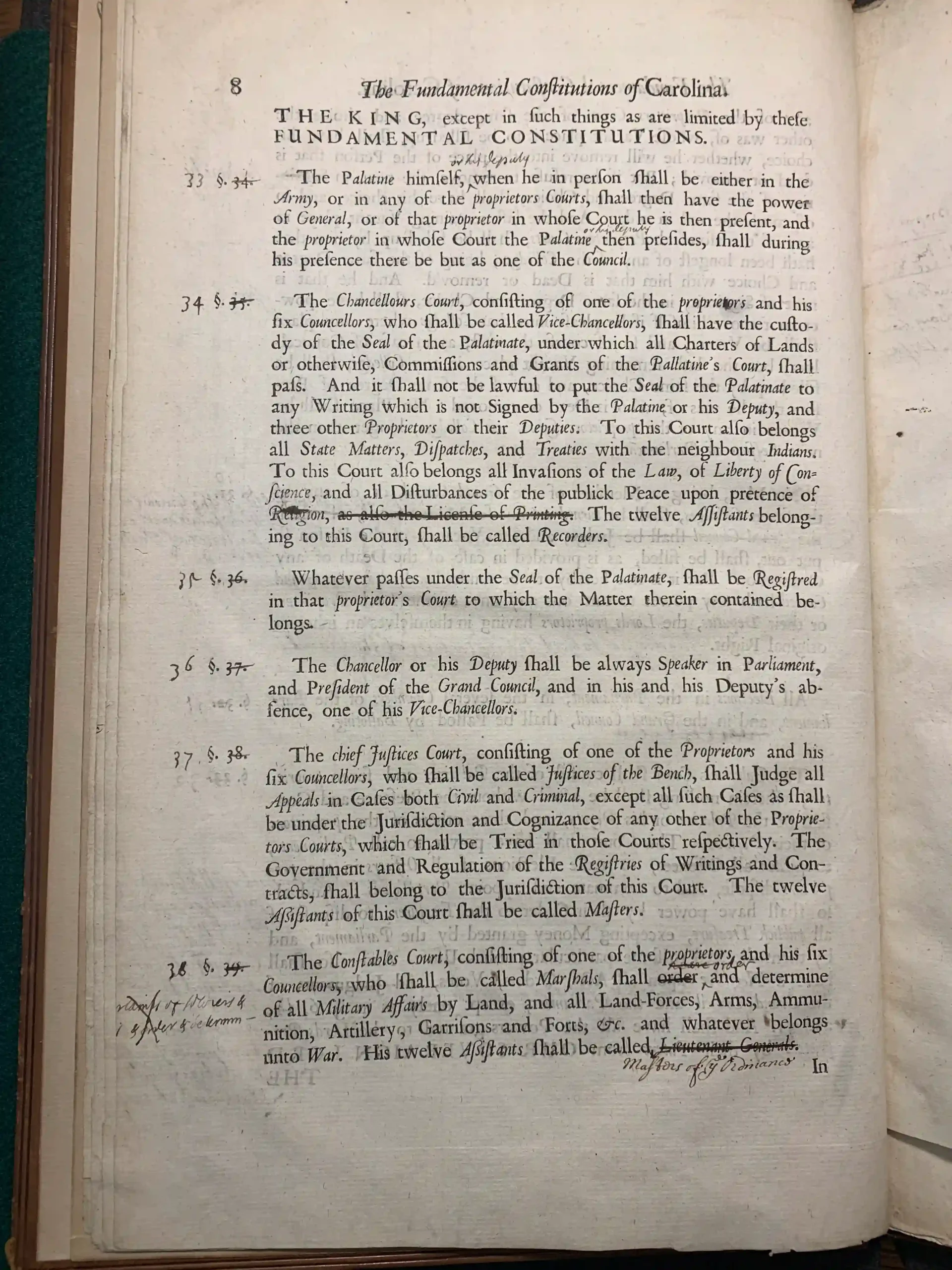
8
THE KING, except in such things as are limited by these
FUNDAMENTAL CONSTITUTIONS.
33 §.34. The Palatine himself, or his deputy when he in person shall be either in the
Army, or in any of the proprietors Courts, shall then have the power
of General, or of that proprietor in whose Court he is then present, and
the proprietor in whose Court the Palatine or his deputy then presides, shall during
his presence there be but as one of the Council.
34 §. 35. The Chancellours Court, consisting of one of the proprietors and his
six Councellors, who shall be called Vice-Chancellors, shall have the custo-
dy of the Seal of the Palatinate, under which all Charters of Lands
or otherwise, Commissions and Grants of the Pallatine`s Court, shall
pass. And it shall not be lawful to put the Seal of the Palatinate to
any Writing which is not Signed by the Palatine or his Deputy, and
three other Proprietors or their Deputies. To this Court also belongs
all State Matters, Dispatches, and Treaties with the neighbour Indians.
To this Court also belongs all Invasions of the Law, of Liberty of Con-
science, and all Disturbances of the publick Peace upon pretence of
Religion, as also the License of Printing. The twelve Assistants belong-
ing to this Court, shall be called Recorders.
35 §.36. Whatever passes under the Seal of the Palatinate, shall be Registred
in that proprietor`s Court to which the Matter therein contained be-
longs.
36 §.37. The Chancellor or his Deputy shall be always Speaker in Parliament,
and President of the Grand Council, and in his and his Deputy’s ab-
sence, one of his Vice-Chancellors.
37 §.38. The chief Justices Court, consisting of one of the Proprietors and his
six Councellors, who shall be called Justices of the Bench, shall Judge all
Appeals in Cases both Civil and Criminal, except all such Cases as shall
be under the Jurisdiction and Cognizance of any other of the Proprie-
tors Courts, which shall be Tried in those Courts respectively. The
Government and Regulation of the Registries of Writings and Con-
tracts, shall belong to the Jurisdiction of this Court. The twelve
Assistants of this Court shall be called Masters.
38 §.39. The Constables Court, consisting of one of the proprietors, and his six
Councellors, who shall be called Marshals, shall order heare order and determine
of all Military Affairs by Land, and all Land-Forces, Arms, Ammu-
nition, Artillery, Garrisons and Forts, &c. and whatever belongs
unto War. His twelve Assistants shall be called Masters of the Ordinance Lieutenant-Generals
{[Editor’s Note: possibly Locke’s handwriting, some part apparently cut off when the book was trimmed] [?] of [soldiers? ] &
[?] & order & determm- }
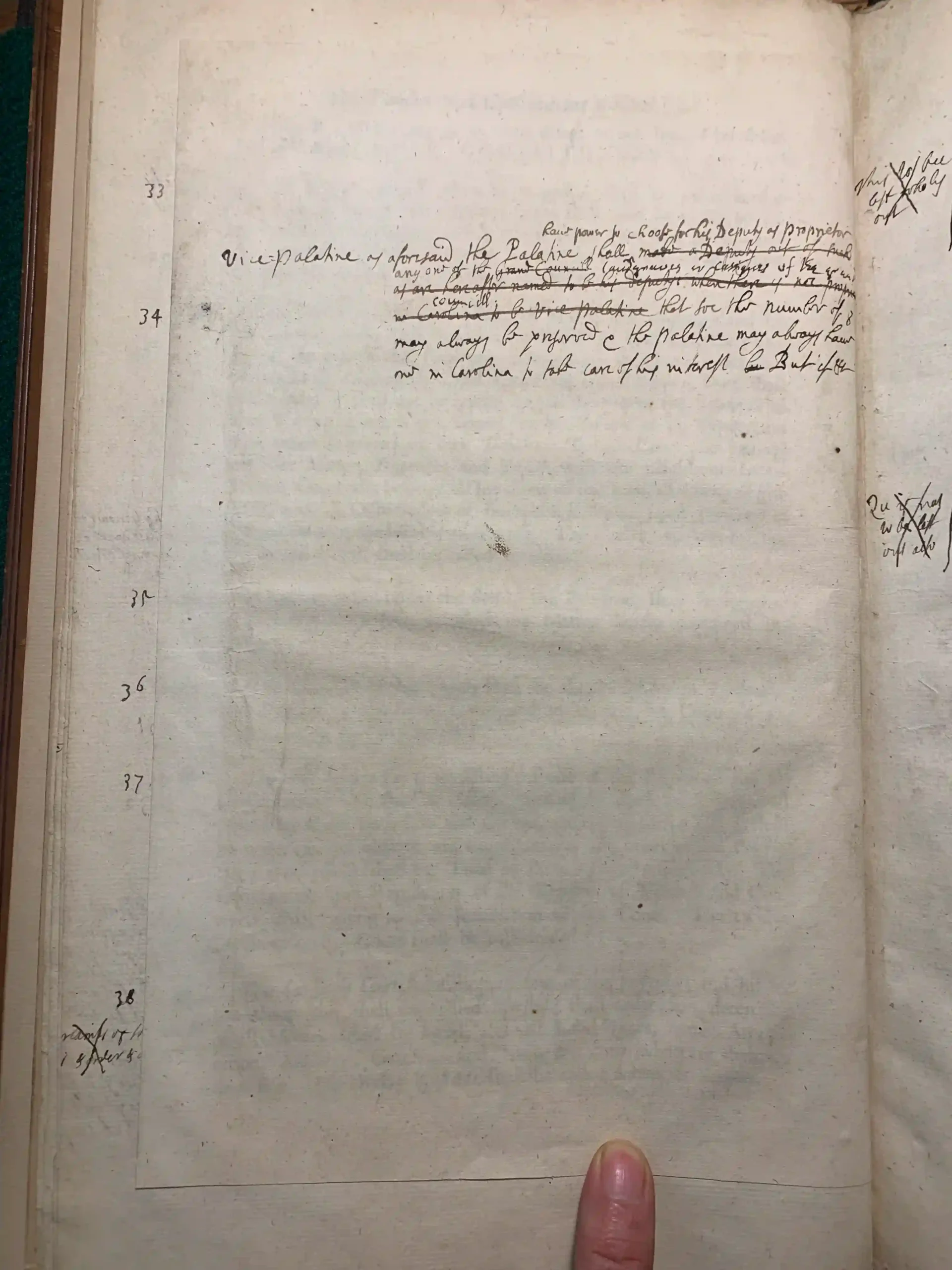
[Editor’s Note: This marginalia is likely in John Locke’s handwriting]
Vice-Palatine as aforesaid, the Palatine shall have power to choose for his Deputy as proprietor landgraves or cassiques of the grand council;make a Deputy out of such
any one of the Grand Councill
as are hereafter named to be his deputy. when there is noe proprie[tor]
in Carolina to be vice palatine that soe the number of 8
may always be preserved & the palatine may always have
one in Carolina to take care of his interest. bu But if &c.
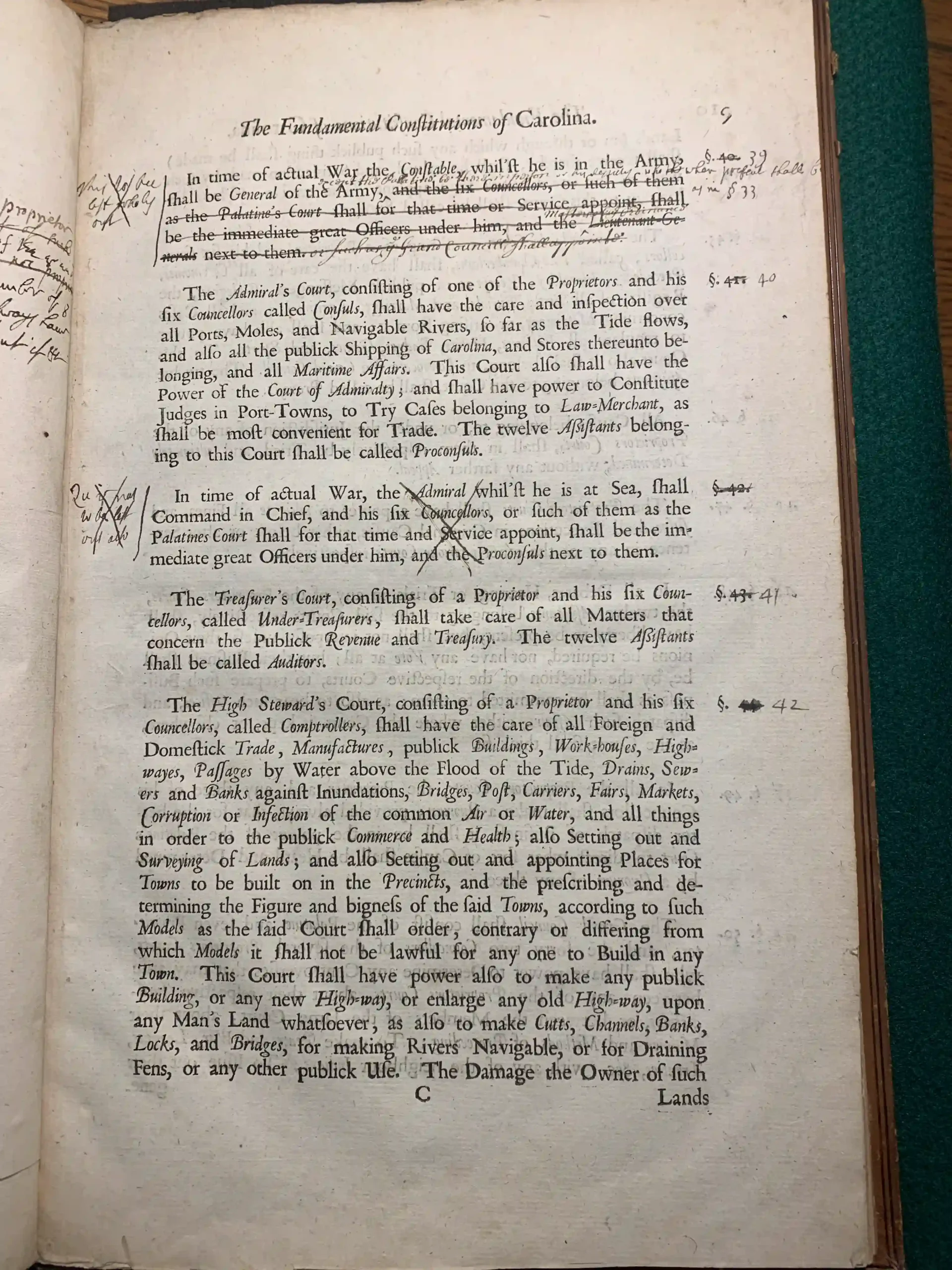
9
{[Editor’s Note: Likely in Locke’s handwriting] This to be left wholy out}§.40. 39 In time of actual War, the Constable whil’st he is in the Army,
shall be General of the Army, [Editor’s Note: Locke’s handwriting] except the Pallatine be there in person or his deputy who the when present shall be as in §33 and the six Councellors, or such of them
as the Palatine`s Court shall for that time or Service appoint, shall
be the immediate great Officers under him, and the Masters of the Ordiannce Lieutenant-Ge-
nerals next to them. or such as the Grand Councill shall appointe.
§.41. 40 The Admiral`s Court, consisting of one of the Proprietors and his
six Councellors called Consuls, shall have the care and inspection over
all Ports, Moles, and Navigable Rivers, so far as the Tide flows,
and also all the publick Shipping of Carolina, and Stores thereunto be-
longing, and all Maritime Affairs. This Court also shall have the
Power of the Court of Admiralty; and shall have power to Constitute
Judges in Port-Towns, to Try Cases belonging to Law-Merchant, as
shall be most convenient for Trade. The twelve Assistants belong-
ing to this Court shall be called Proconsuls.
{[Editor’s Note: Locke’s handwriting] Qu it has to be left out also}§. 42. In time of actual war, the Admiral whil’st he is at Sea, shall
Command in Chief, and his six Councellors, or such of them as the
Palatines Court shall for that time and Service appoint, shall be the im-
mediate great Officers under him, and the Proconsuls next to them.
§.43. 41 The Treasurer`s Court, consisting of a Proprietor and his six Coun-
cellors, called Under-Treasurers, shall take care of all Matters that
concern the Publick Revenue and Treasury. The twelve Assistants
shall be called Auditors.
§.44. 42 The High Steward`s Court, consisting of a Proprietor and his six
Councellors, called Comptrollers, shall have the care of all Foreign and
Domestick Trade, Manufactures, publick Buildings, Work-houses, High-
wayes, Passages by Water above the Flood of the Tide, Drains, Sew-
ers and Banks against Inundations, Bridges, Post, Carriers, Fairs, Markets,
Corruption or Infection of the common Air or Water, and all things
in order to the publick Commerce and Health; also Setting out and
Surveying of Lands; and also Setting out and appointing Places for
Towns to be built on in the Precincts, and the prescribing and de-
termining the Figure and bigness of the said Towns, according to such
Models as the said Court shall order, contrary or differing from
which Models it shall not be lawful for any one to Build in any
Town. This Court shall have power also to make any publick
Building, or any new High-way, or enlarge any old High-way, upon
any Man’s Land whatsoever, as also to make Cutts, Channels, Banks,
Locks, and Bridges, for making Rivers Navigable, or for Draining
Fens, or any other publick Use. The Damage the Owner of such

10
Lands (on or through which any public thing shall be made)
shall receive thereby, shall be valued, and Satisfaction made by such
ways as the Grand Council shall appoint. The twelve Assistants be-
longing to this Court, shall be called Surveyors.
43 §.45. The Chamberlain`s Court, consisting of a Proprietor and his six Coun-
cellors, called Vice-Chamberlains, shall have the care of all civill Ceremonies,
Precedency, Heraldry, Reception of publick Messengers, Pedegrees, the
Registry of all Births, Burials, and Marriages, Legitimation, and all Cases
concerning Matrimony, or arising from it; and shall also have power
to regulate all Fashions, Habits, Badges, Games, and Sports. To this
Court also it shall belong, to Convocate the Grand Council. The twelve
Assistants belonging to this Court, shall be called Provosts.
44 §.46. All Causes belonging to, or under the Jurisdiction of any of the
Proprietors Courts, shall in them respectively be Tried, and ultimately
Determined, without any farther Appeal.
45 §.47. The Proprietors Courts shall have a power to mitigate all Fines, and
suspend all Executions in Criminal Causes, either before or after Sen-
tence in any of the other inferiour Courts respectively.
46 §.48. In all Debates, Hearings or Trials, in any of the Proprietors Courts,
the twelve Assistants belonging to the said Courts respectively, shall
have liberty to be present, but shall not interpose, unless their Opi-
nions be required, nor have any Vote at all; but their Business shall
be, by the direction of the respective Courts, to prepare such Busi-
ness as shall be committed to them; as also to bear such Offices, and
dispatch such Affairs, either where the Court is kept, or elsewhere,
as the Court shall think fit.
47 §.49. In all the Proprietors Courts, the Proprietor, and any three of his
Councellors shall make a Quorum; provided always, that for the bet-
ter dispatch of Business, it shall be in the power of the Palatine`s
Court to direct what sort of Causes shall be Heard and Determined
by a Quroum of any three.
48 §.50. The Grand Council shall consist of the Palatine and seven Proprie-
tors, and the forty two Councellors of the several Proprietors Courts,
who shall have power to Determine any Controversies that may arise
between any of the Proprietors Courts, about their respective Juris-
dictions, or between the Members of the same Court, about their
Manner and Methods of Proceeding: To make Peace and War, Leagues,
Treaties, &c. with any of the neighbour Indians: To Issue out their
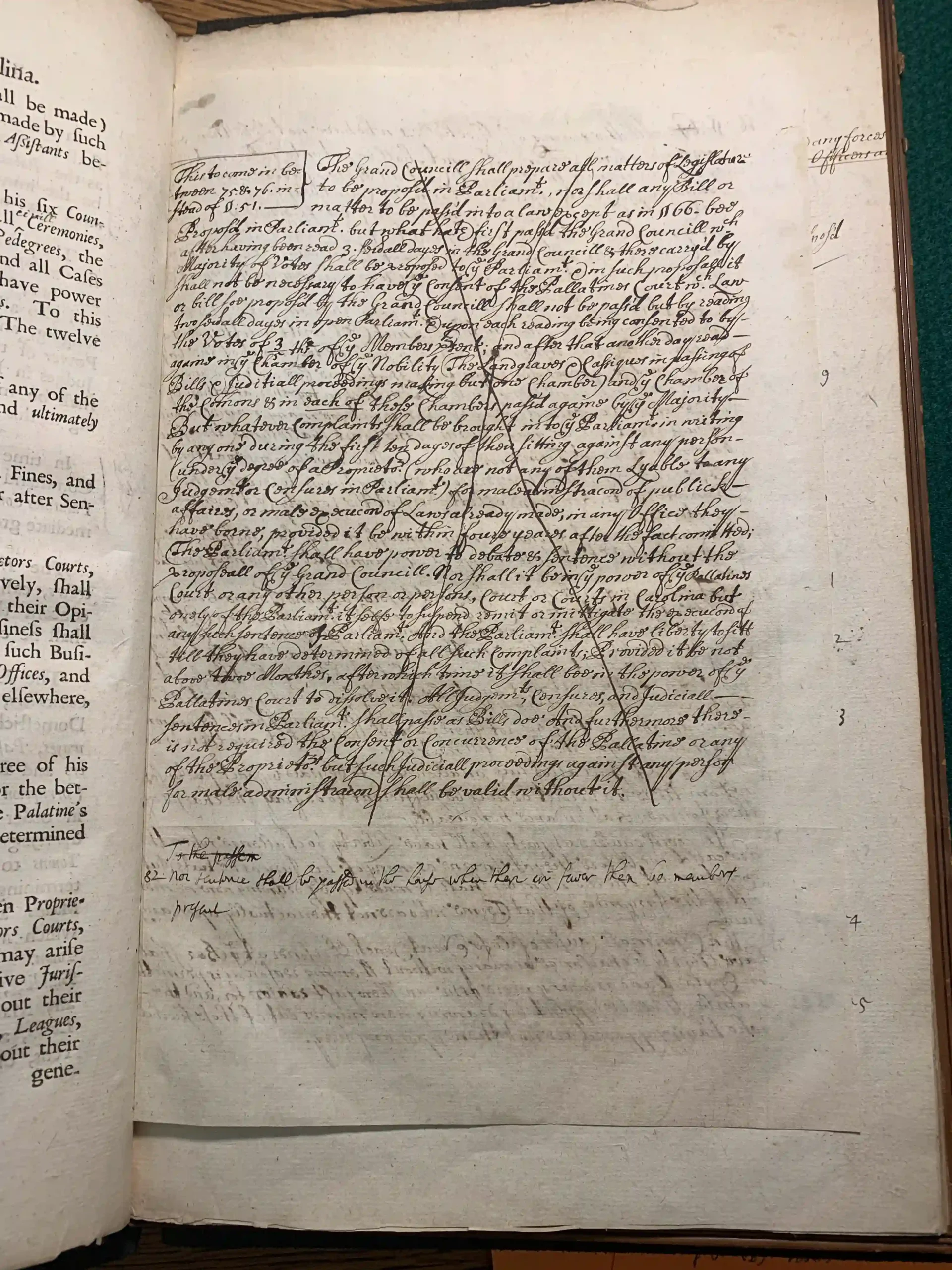
{This to come in between 75. & 76. instead of §:51.}
The Grand Councill shall prepare all matters of Legislation
to be propos’d in Parliament, nor shall any Bill or
matter to be pass’d into a law except as in §66. bee
Propos’d in Parliament but what hath first pass’d the Grand Councill, which
after having been read 3 Severall dayes in the Grand Councill & there carry’d by
Majority of Votes shall be proposed to the Parliament & in such proposall it
shall not be necessary to have the Consent of the Pallatines Court which Law
or bill soe propos’d by the Grand Councill shall not be pass’d but by reading
two Severall dayes in open Parliament & upon each reading being consented to by
the Votes of 3/5ths of the Members present; and after that another day read
againe in the Chamber of the Nobility (The Landgraves & Cassiques in passing of
Bills & Juditiall proceedings making but one Chamber) and the Chamber of
the Commons & in each of these Chambers pass’d againe by the Majority.
But whatever Complaints shall be brought in to the Parliament in writing
by any one during the first ten dayes of their Sitting against any person
(under the degree of all Proprietors (who are not any of them Lyable to any
Judgement or Censures in Parliament) for maleadministracon of publick
affaires, or male [execution?] of Laws already made, in any Office they
have borne, provided it be within foure yeares after the fact committed;
The Parliament shall have power to debate & sentence without the
propossall of the Grand Councill. Nor shall it be in the power of the Pallatines
Court or any other person or persons, Court or Courts in Carolina but
onely of the Parliament itselfe to suspend remit or mittigate the [execution?] of
any such sentence of Parliament. And the Parliament shall have liberty to sitt
till they have determined of all such Complaints; Provided it be not
above [two] Monthes, after which time it shall bee in the power of the
Pallatines Court to dissolve it. All Judgements, Censures, and Judiciall
Sentences in Parliament shall passe as Bills doe. And furthermore there
is not required the Consent or Concurrence of the Pallatine or any
of the Proprietors but such Judiciall proceedings against any person
for maleadministracon shall be valid without it.
To the passem
82 nor sentence shall be passed in the house when there are fewer than 60 members
present
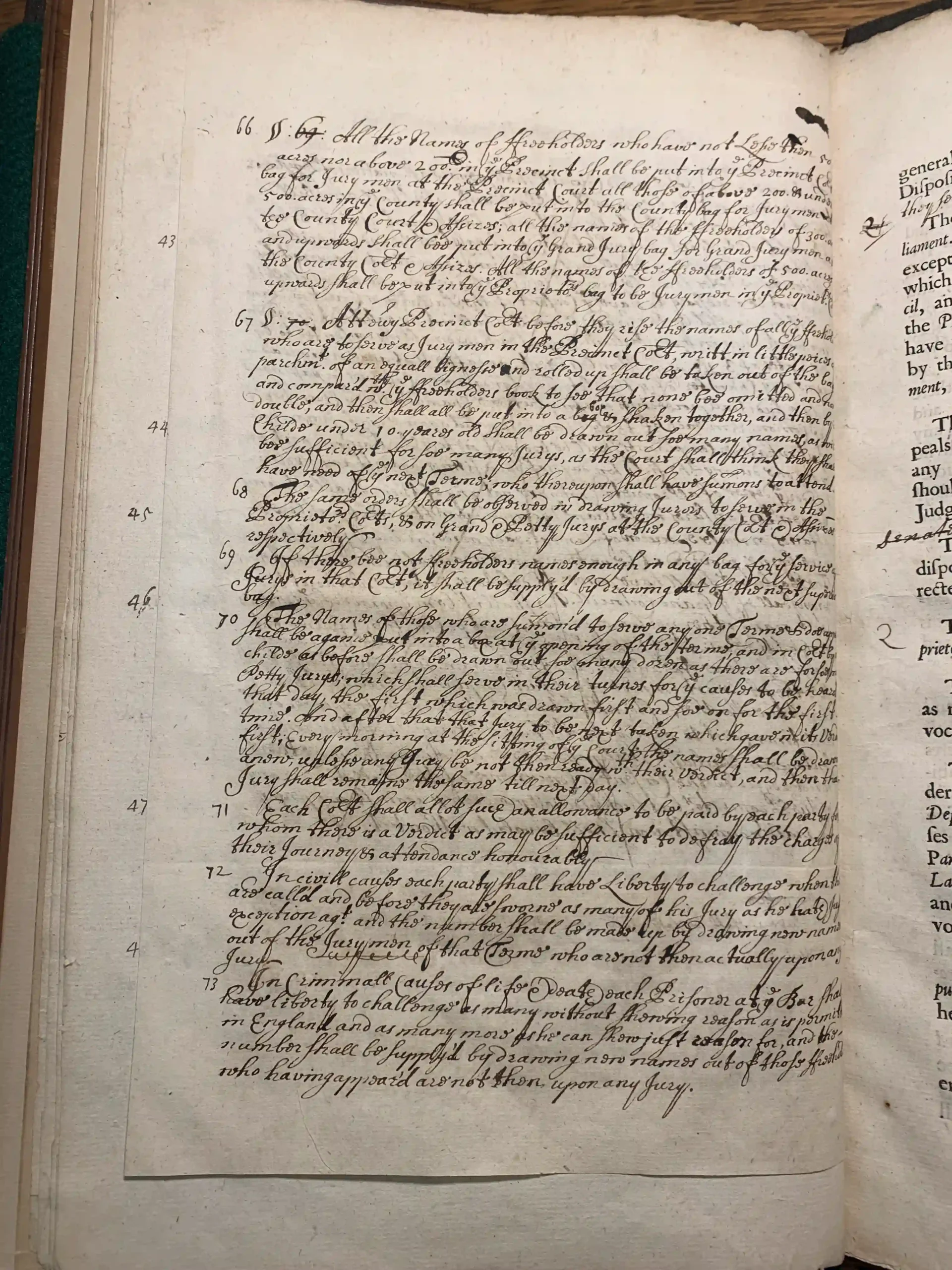
66 §: 69: All the Names of Freeholders who have not Lesse than 50
acres nor above 200 in the Precinct shall be put into the Precinct [?]
bag for Jury men at the Precinct Court all those of above 200 & under
500 acres in the County shall be put into the County bag for Jurymen at
the County Court & Assizes; all the names of the Freeholders of 300 acres
and upwards shall bee put into the Grand Jury bag for Grand Jury men at
the County Court & Assizes. All thenames of the Freeholders of 500 acres
upwards shall be put into the Proprietors bag to be Jurymen in the Proprietors Court.
67 §: 70: Att every Precinct Court before they rise the names of all ye Freeholders
who are to serve as Jurymen in the Precinct Court, writt in little peices of
parchment of an equall bignesse and rolled up shall be taken out of the bag
and compar’d with the Freeholders book to see that none bee omitted and none
double, and then shall all be put into a bag box & shaken together, and then by a
Childe under 10 yeares old shall be drawn out soe many names, as will
bee Sufficient for soe many Jurys, as the Court shall think they shall
have need of the next Terme; who thereupon shall have Summons to attend.
68 The Same orders shall be observed in drawing Jurors to serve in the
Proprietors Courts, & on Grand & Petty Jurys at the County Court & at Assizes
respectively.
69 If there bee not Freeholders names enough in any bag for the Service [of?]
Jurys in that Court, it shall be Supply’d by drawing out of the next [Superiour?]
bag.
70 The Names of those who are Summon’d to serve any one Terme & doe [appear?]
shall be aganie put into a bag at the opening of the terme, and in Court by a
childe as before shall be drawn out soe many dozen as there are for Soe [?]
Petty Jurys; which shall serve in their turnes for the causes to be heard
that day, the first which was drawn first and soe on for the first
time. And after that that Jury to be next taken which gave in its [Verdict?]
first; Every morning at the Sitting of the Court the names shall be drawn
anew, unlesse any Jury be not then ready with their Verdict, and then that
Jury shall remaine the same till next day.
71 Each Court shall allot Jurys an allowance to be paid by each party for
whom there is a Verdict as may be sufficient to defray the charges of
their Journeys & attendance honourably.
72 In civill causes each party shall have Liberty to challenge when they
are call’d and before they are Sworne as many of his Jury as he hath [?]
exception against and the number shall be made up by drawing new names
out of the Jurymen of that Terme who are not then actually upon any
Jury. [?]
73 In Criminnall causes of life & death each Prisoner at the Bar shall
have liberty to challenge as many without Shewing reason as is permitted
in England and as many more as he can show just reason for, and the
number shall be supply’d by drawing new names out of those Freeholders
who having appear’d are not then upon any Jury.
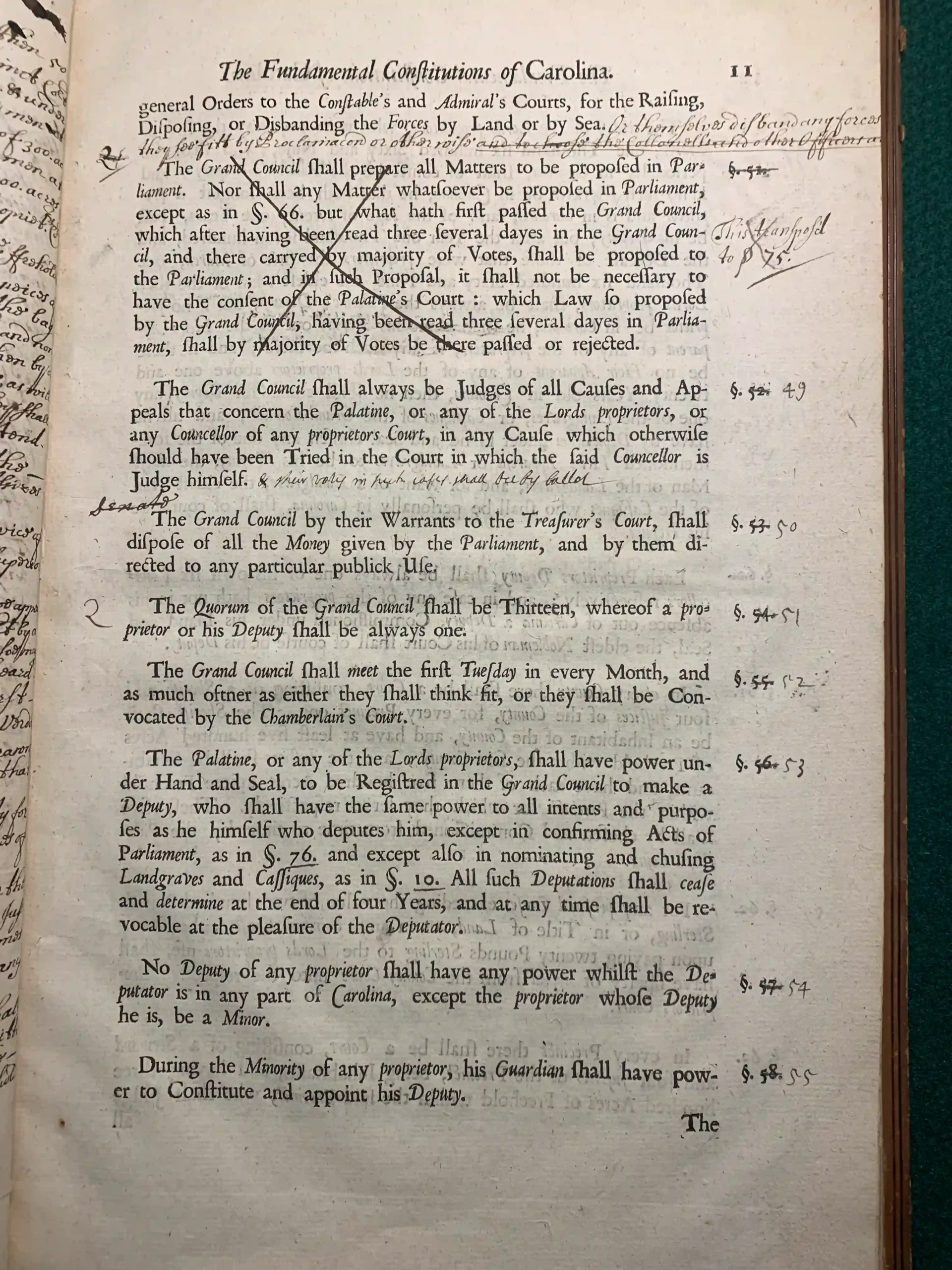
11
general Orders to the Constable`s and Admiral`s Courts, for the Raising,
Disposing, or Disbanding the Forces by Land or Sea. Or themselves disband any forces
they see fitt by Proclamacon or otherwise and to choose the Collonells and other Officers [as?]
Qu §.51. The Grand Council shall prepare all Matters to be proposed in Par-
liament. Nor shall any Matter whatsoever be proposed in Parliament,
except as in §.66. but what hath first passed the Grand Council,
which after having been read three several dayes in the Grand Coun-
cil, and there carryed by majority of Votes, shall be proposed to
the Parliament; and in such Proposal, it shall not be necessary to
have the consent of the Palatine‘s Court: which Law so proposed
by the Grand Council, having been read three several dayes in Parlia-
ment, shall by majority of Votes be there passed or rejected. {This transpos’d to § 75.}
§.52. 49 The Grand Council shall always be Judges of all Causes and Ap-
peals that concern the Palatine, or any of the Lords proprietors, or
any Councellor of any proprietors Court, in any Cause which otherwise
should have been Tried in the Court in which the said Councellor is
Judge himself. & their votes in such cases shall bee by ballot
{Senate}
§.53. 50 The Grand Council by their Warrants to the Treasurer`s Court, shall
dispose of all the Money given by the Parliament, and by them di-
rected to any particular publick Use.
§.54. 51 Q The Quorum of the Grand Council shall be Thirteen, whereof a pro-
prietor or his Deputy shall be always one.
§.55. 52 The Grand Council shall meet the first Tuesday in every Month, and
as much oftner as either they shall think fit, or they shall be Con-
vocated by the Chamberlain`s Court.
§.56. 53 The Palatine, or any of the Lords proprietors, shall have power un-
der Hand and Seal, to be Registred in the Grand Council to make a
Deputy, who shall have the same power to all intents and purpo-
ses as he himself who deputes him, except in confirming Acts of
Parliament, as in §.76. and except also in nominating and chusing
Landgraves and Cassiques, as in §.10. All such Deputations shall cease
and determine at the end of four Years, and at any time shall be re-
vocable at the pleasure of the Deputator.
§.57. 54 No Deputy of any proprietor shall have any power whilst the De-
putator is in any part of Carolina, except the proprietor whose Deputy
he is, be a Minor.
§.58. 55 During the Minority of any proprietor, his Guardian shall have pow-
er to Constitute and appoint his Deputy.
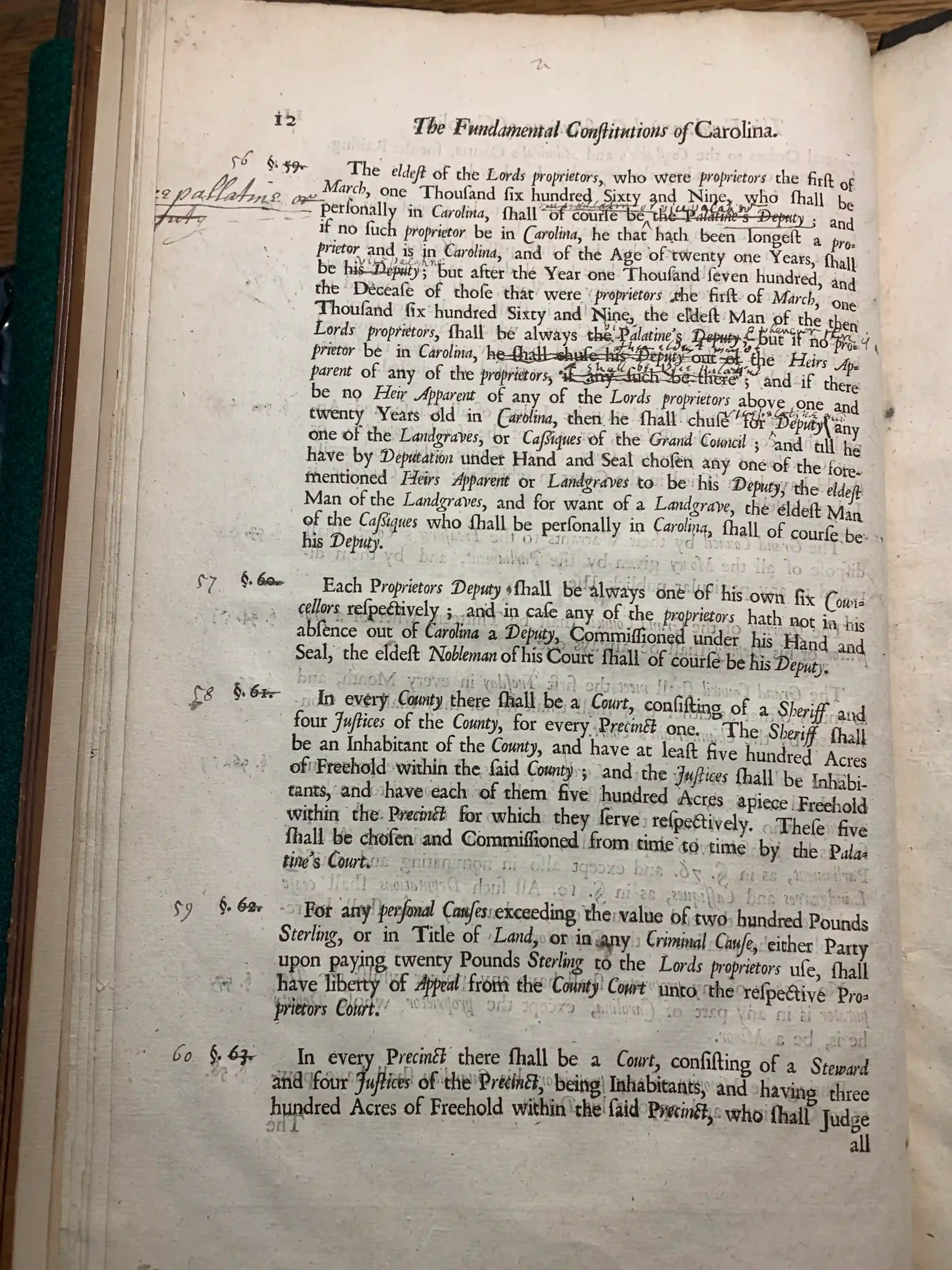
12
[Editorial note: Locke’s handwriting (likely) appears in the interleaved corrections to paragraph 56]
{ [?ce] pallatine or [deputy?] }56 §.59. The eldest of the Lords proprietors, who were proprietors the first of
March, one Thousand six hundred Sixty and Nine, who shall be
personally in Carolina, shall of course be vice prallatum or vice palatine the Palatine‘s Deputy; and
if no such proprietor be in Carolina, he that hath been longest a pro-
prietor and is in Carolina, and of the Age of twenty one Years, shall
be his Deputy vice pallatine; but after the Year one Thousand seven hundred, and
the Decease of those that were proprietors the first of March, one
Thousand six hundred Sixty and Nine, the edlest Man of the then
Lords proprietors, shall be always the vice Palatine‘s Deputy; whenever there is a but if no pro-
prietor be in Carolina, he shall chuse his Deputy out of the eldest man of the Heirs Ap-
parent of any of the proprietors, if any such be there shall be Vice Pallatine; and if there
be no Heir Apparent of any of the Lords proprietors above one and
twenty Years old in Carolina, then he shall chuse for vice palatine and Deputy any
one of the Landgraves, or Cassiques of the Grand Council; and till he
have by Deputation under Hand and Seal chosen any of the fore-
mentioned Heirs Apparent or Landgraves to be his Deputy, the eldest
Man of the Landgraves, and for want of a Landgrave, the eldest Man
of the Cassiques who shall be personally in Carolina, shall of course be
his Deputy.
57 §.60. Each Proprietors Deputy shall be always one of his own six Coun-
cellors respectively; and in case any of the proprietors hath not in his
absence out of Carolina a Deputy, Commissioned under his Hand and
Seal, the eldest Nobleman of his Court shall of course be his Deputy.
58 §.61. In every County there shall be a Court, consisting of a Sheriff and
four Justices of the County, for every Precinct one. The Sheriff shall
be an Inhabitant of the County, and have at least five hundred Acres
of Freehold within the said County; and the Justices shall be Inhabi-
tants, and have each of them five hundred Acres apiece Freehold
within the Precinct for which they serve respectively. These five
shall be chosen and Commissioned from time to time by the Pala-
tine’s Court.
59 §.62. For any personal Causes exceeding the value of two hundred Pounds
Sterling, or in Title of Land, or in any Criminal Cause, either Party
upon paying twenty Pounds Sterling to the Lords proprietors use, shall
have liberty of Appeal from the County Court unto the respective Pro-
prietors Court.
60 §.63. In every Precinct there shall be a Court, consisting of a Steward
and four Justices of the Precinct, being Inhabitants, and having three
hundred Acres of Freehold within the said Precinct, who shall Judge
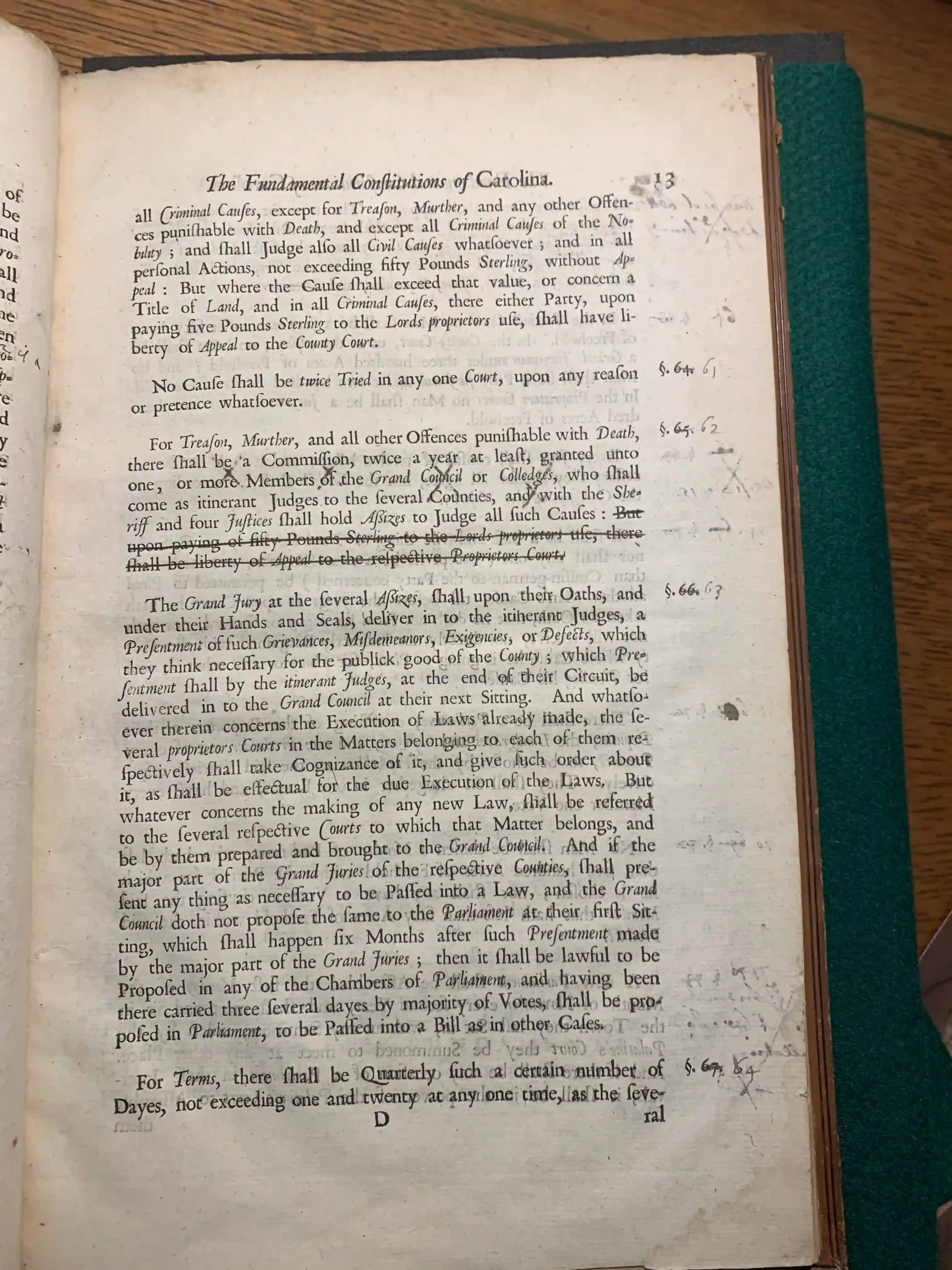
13
all Criminal Causes, except for Treason, Murther, and any other Offen-
ces punishable with Death, and except all Criminal Causes of the No-
bility; and shall Judge also all Civil Causes whatsoever; and in all
personal Actions, not exceeding fifty Pounds Sterling, without Ap-
peal: But where the Cause shall exceed that value, or concern a
Title of Land, and in all Criminal Causes, there either Party, upon
paying five Pounds Sterling to the Lords proprietors use, shall have li-
berty of Appeal to the County Court.
§.64. 61 No Cause shall be twice Tried in any one Court, upon any reason
or pretence whatsoever.
§.65. 62 For Treason, Murther, and all other Offences punishable with Death,
there shall be a Commission, twice a year at least, granted unto
one, or more Members of the Grand Council or Colledges, who shall
come as itinerant Judges to the several Counties, and with the She-
riff and four Justices shall hold Assizes to Judge all such Causes: But
upon paying of fifty Pounds Sterling to the Lords proprietors use, there
shall be liberty of Appeal to the respective Proprietors Courts.
§.66.63 The Grand Jury at the several Assizes, shall upon their Oaths, and
under their Hands and Seals, deliver in to the itinerant Judges, a
Presentment of such Grievances, Misdemeanors, Exigencies, or Defects, which
they think necessary for the publick good of the County; which Pre-
sentment shall by the itinerant Judges, at the end of their Circuit, be
delivered in to the Grand Council at their next Sitting. And whatso-
ever therein concerns the Execution of Laws already made, the se-
veral proprietors Courts in the Matters belonging to each of them re-
spectively shall take Cognizance of it, and give such order about
it, as shall be effectual for the due Execution of the Laws. But
whatever concerns the making of any new Law, shall be referred
to the several respective Courts to which that Matter belongs, and
be by them prepared and brought to the Grand Council. And if the
major part of the Grand Juries of the respective Counties, shall pre-
sent any thing as necessary to be Passed into a Law, and the Grand
Council doth not propose the same to the Parliament at their first Sit-
ting, which shall happen six Months after such Presentment made
by the major part of the Grand Juries; then it shall be lawful to be
Proposed in any of the Chambers of Parliament, and having been
there carried three several dayes by majority of Votes, shall be pro-
posed in Parliament, to be Passed into a Bill as in other Cases.
§.67. 64 For Terms, there shall be Quarterly such a certain number of
Dayes, not exceeding one and twenty at any one time, as the seve-

14
{[?ber not] put better [[cut off] ?tter] the times} ial respective Courts shall appoint. The time for the beginning of
the Term in the Precinct Court, shall be the first Monday in January February
April May, July August, and October November ; in the County Court, the first Monday in Febru- January
ary, May [?], August July, and November October; and in the Proprietors Courts, the
first Monday in March, June, September, and December.
65 §.68. In the Precinct Court no Man shall be a Jury-man under fifty Acres
of Freehold. In the County Court, or at the Assizes, no Man shall be
a Grand Jury-man under three hundred Acres of Freehold; and no
Man shall be a Petty Jury-man under two hundred Acres of Freehold.
In the Proprietors Courts no Man shall be a Jury-man under five hun-
dred Acres of Freehold.
{Query – [Either?] 12 or 15.} 66 §.69. Every Jury shall consist of twelve Men; and it shall not be ne-
cessary they should all agree, but the Verdict shall be according to
the Consent of the Majority.
74 67 §.70. It shall be a base and vile thing to Plead for Money or Reward;
nor shall any one (except he be a near Kinsman, not farther off
than Cousin-german to the Party concerned) be permitted to Plead
another Man’s Cause, till before the Judge in open Court he hath
taken an Oath, that he doth not Plead for Money or Reward, nor hath
nor will receive, nor directly nor indirectly Bargained with the Par-
ty whose Cause he is going to Plead, for Money or any other Reward
for Pleading his Cause.
75 68 §.71. There shall be a Parliament, consisting of the Proprietors or their
Deputies, the Landgraves and Cassiques, and one Freeholder out of every
Precinct, to be chosen by the Freeholders of the said Precinct respe-
ctively. They shall Sit altogether in one Room, and have every
Member one Vote.
76 69 §.72. No Man shall be chosen a Member of Parliament, who hath less
than five hundred Acres of Freehold within the Precinct for which
he is chosen; nor shall any have a Vote in chusing the said
Member that hath less than fifty Acres of Freehold within the said
Precinct.
{[[cut off] ?t] the members [[cut off] ?e] not bee chosen [[cut off] balloting?]} {gra Also} 77 70 §.73. A new Parliament shall be Assembled the first Monday of the
Month of November every second Year, and shall meet and Sit in
the Town they last Sat in, wihtout any Summons, unless by the
Palatine`s Court they be Summoned to meet at any other Place.
And if there shall be any occasion of a Parliament in these Inter-
vals, it shall be in the power of the Palatine`s Court to Assemble
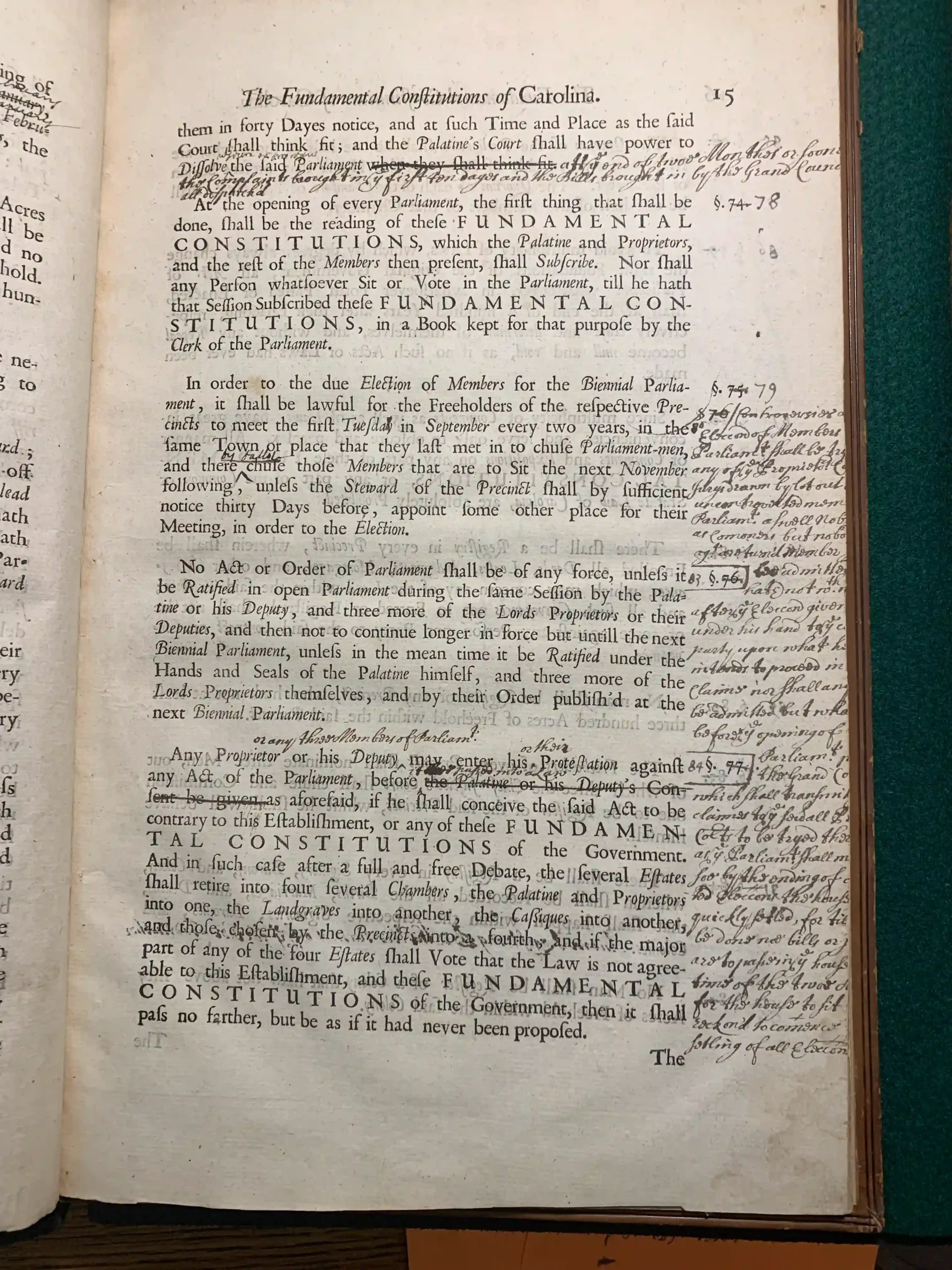
15
them in forty Dayes notice, and at such Time and Place as the said
Court shall think fit; and the Palatine`s Court shall have power to
Dissolve adjourn or prorogue the said Parliament when they shall think fit att the end of two Monthes or Sooner
the Complaints brought in the first ten dayes and the Bills brought in by the Grand Council
all dispatch’d
§.74. 78 At the opening of every Parliament, the first thing that shall be
done, shall be the reading of these FUNDAMENTAL
CONSTITUTIONS, which the Palatine and Proprietors,
and the rest of the Members then present, shall Subscribe. Nor shall
any Person whatsoever Sit or Vote in the Parliament, till he hath
that Session Subscribed these FUNDAMENTAL CON-
STITUTIONS, in a Book kept for that purpose by the
Clerk of the Parliament.
§.75. 79 In order to the due Election of Members for the Biennial Parlia-
ment, it shall be lawful for the Freeholders of the respective Pre-
cincts to meet the first Tuesday in September every two years, in the
same Town or place that they last met in to chuse Parliament-men,
and there by ballot chuse those Members that are to Sit the next November
following, unless the Steward of the Precinct shall by sufficient
notice thirty Days before, appoint some other place for their
Meeting, in order to the Election.
{§.76 80 Controversies [a?[cut off]] Eleccon of Members [[cut off]] Parliament shall be [try? [cut off]] any of the Proprietors [Courts? [cut off]] Jurys drawn by lot out [[cut off]] uncontroverted [members? [cut off]] Parliament as well [Nobility? [cut off]] as Comoners but [nobody? [cut off]] against a return’d Member [[cut off]] bee admitted hath not with [n? [cut off]] after the Eleccon given [[cut off]] under his hand to the [c? [cut off]] party upon what [he? [cut off]] intends to proceed in [[cut off]] Claime nor shall any [[cut off]] be admitted but who [[cut off]] before the opening of [[cut off]] Parliament [p? [cut off]] the Grand [Council? [cut off]] which shall transmit [[cut off]] claims to the Severall [P? [cut off]] Courts to be tryed there [[cut off]] as the Parliament shall [m? [cut off]] soe by the ending of [c? [cut off]] -ted Eleccons the [house? [cut off]]quickly setled, for til [[cut off]] be done noe bills or [? [cut off]] are to passe in the house [[cut off]] time of the two [d? [cut off]] for the house to sit [[cut off]] reckon’d to comence settling of all Eleccons}
83 §.76. No Act or Order of Parliament shall be of any force, unless it
be Ratified in open Parliament during the same Session by the Pala-
tine or his Deputy, and three more of the Lords Proprietors or their
Deputies, and then not to continue longer in force but untill the next
Biennial Parliament, unless in the mean time it be Ratified under the
Hands and Seals of the Palatine himself, and three more of the
Lords Proprietors themselves, and by their Order publish’d at the
next Biennial Parliament.
84 §.77. Any Proprietor or his Deputy or any three Members of Parliament may enter his or their Protestation against
any Act of the Parliament, before the Palatine or his Deputy‘s Con- it [has?] passed into a Law
sent be given as aforesaid, if he shall conceive the said Act to be
contrary to this Establishment, or any of these FUNDAMEN-
TAL CONSTITUTIONS of the Government.
And in such case after a full and free Debate, the several Estates
shall retire into four several Chambers, the Palatine and Proprietors
into one, the Landgraves into another, the Cassiques into another,
and those chosen by the Precinct into a fourth, and if the major
part of any of the four Estates shall Vote that the Law is not agree-
able to this Establishment, and these FUNDAMENTAL
CONSTITUTIONS of the Government, then it shall
pass no farther, but be as if it had never been proposed.

16
85 §.78. The Quorum of the Parliament shall be one half of those who are
Members, and capable of Sitting in the House that present Session
of Parliament. The Quorum of each of the Chambers of Parliament, shall
be one half of the Members of that Chamber.
86 §.79. To avoid multiplicity of Laws, which by degrees always change
the right Foundations of the original Government, all Acts of
Parliament whatsoever, in whatsoever Form Passed or Enacted,
shall at the end of a hundred Years after their Enacting, respe-
ctively cease and determine of themselves, and without any Repeal
become null and void, as if no such Acts or Laws had ever been
made.
87 §.80. Since multiplicity of Comments as well as of Laws, have great in-
conveniencies, and serve only to obscure and perplex. All manner
of Comments and Expositions on any part of these FUNDAMEN-
TAL CONSTITUTIONS, or any part of the Common or
Statute Law of Carolina, are absolutely Prohibited.
88. §.81. There shall be a Registry in every Precinct, wherein shall be
Enrolled all Deeds, Leases, Judgments, Mortgages, and other Convey-
ances, which may concern any of the Land within the said Precinct;
and all such Conveyances not so Entred or Registred, shall not be
of force against any Person or Party to the said Contract or Con-
veyance.
89 §.82. No man shall be Register of any Precinct, who hath not at least
three hundred Acres of Freehold within the said Precinct.
90 §.83. The Freeholders of every Precinct shall nominate three Men, out
of which three the Chief Justice`s Court shall chuse and Commission
one to be Register of the said Precinct, whilst he shall well behave
himself.
91 §.84. There shall be a Registry in every Signiory, Barony, and Colony,
wherein shall be Recorded all the Births, Marriages, and Deaths,
that shall happen within the respective Signiories, Baronies, and
Colonies. And in Registring Births the Names of the Father and Mother
92 §.85. No Man shall be Register of a Colony that hath not above fifty
Acres of Freehold within the said Colony.
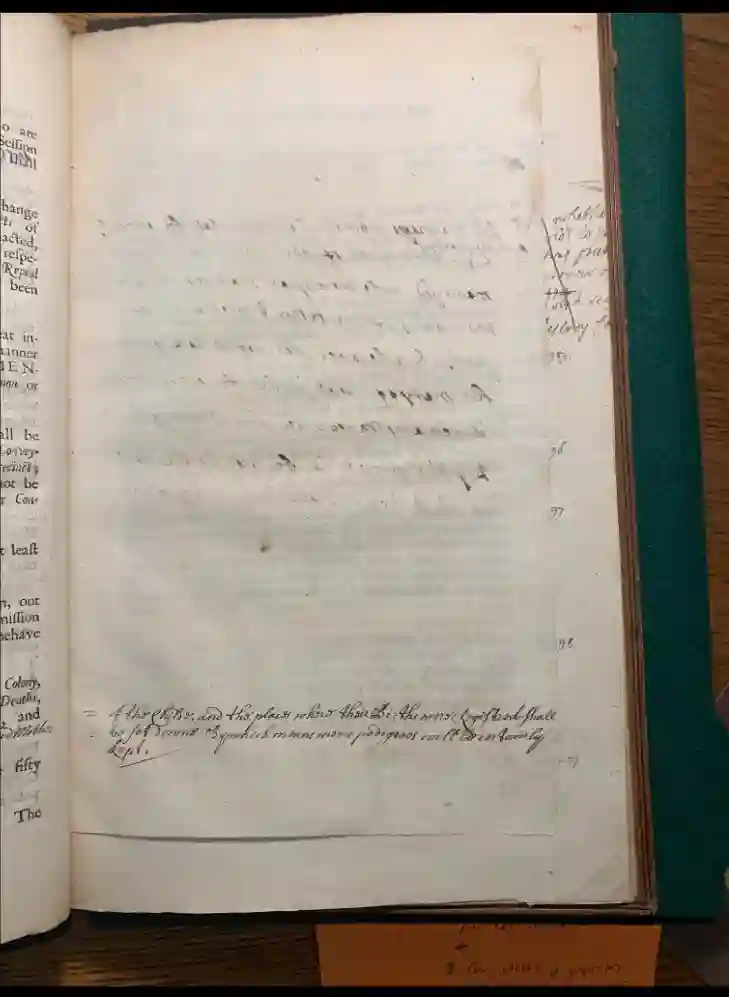
{of the Childe, and the places where their Births were Registred Shall
be set downe: By which means mens pedigrees will be certainly
kept./}
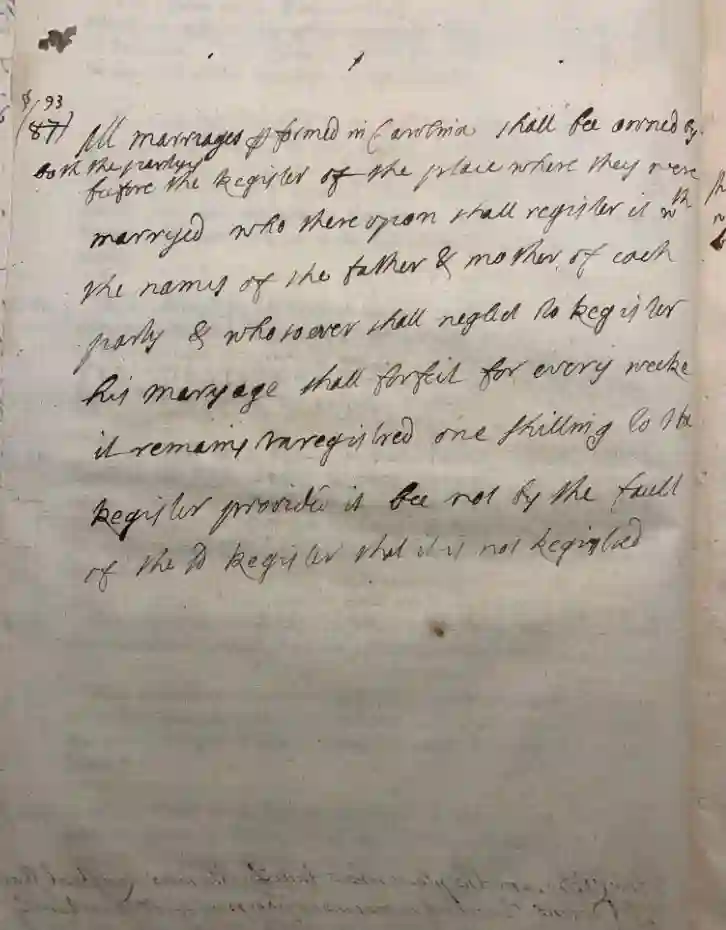
[Editor’s Note: Locke’s handwriting, probably]
§ 93
(87) All marriages performed in Carolina shall bee owned by
both the partys
before the Register of the place where they were
marryed who there upon shall register it with
the names of the father & mother of each
party & whosoever shall neglect to Register
his maryage shall forfeit for every weeke
it remains unregistred one shilling to the
Register provided it bee not by the fault
of the said Register that it is not Registred

17
§. 86. The time of every ones Age that is born in Carolina, shall be rec-
koned from the Day that his Birth is Entred in the Registry, and
not before.
§. 87. Q. This [?] with a [?mulctt] No Marriage, Celebrated in Carolina shall be lawful, whatever Contract and Cere-
mony they have used, till both the Parties mutually own it
before the Register of the Place where they were Married, and he
Register it, with the Names of the Father and Mother of each
Party.
{ [Editor’s Note: Locke’s handwriting, probably] Qu whether [[cut off]] bee not to [s? [cut off]] for this [pa? [cut off]] the power [o? [cut off]] knavish [reg? [cut off]] to destroy [fa? [cut off]] }
94 §.88.§ 94 No Man shall Administer to the Goods, or have right to them,
or enter upon the Estate of any Person deceased, till his Death be
Registred in the respective Registry.
§.89. 95 He that doth not Enter in the respective Registry, the Birth or
Death of any Person that is born or dies in his House or Ground, shall
pay to the said Register one Shilling per Week for each such Neglect,
reckoning from the time of each Birth or Death respectively, to the
time of Registring it.
§.90. 96 In like manner the Births, Marriages, and Deaths of the Lords Pro-
prietors, Landgraves, and Cassiques, shall be Registred in the Chamber-
lain’s Court.
§.91. 97 There shall be in every Colony one Constable, to be chosen annu-
ally by the Freeholders of the Colony: His Estate shall be above a
hundred Acres of Freehold within the said Colony, and such subordi-
nate Officers appointed for his Assistance, as the County Court shall
find requisite, and shall be established by the said County Court. The
Election of the subordinate annual Officers shall be also in the Free-
holders of the Colony.
§.92. 98 It being of great consequence to the Plantation, that Port-Towns
should be built and preserved; Therefore whosoever shall lade or
unlade any Commodity at any other Place but a Port-Town, shall
forfeit to the Lords proprietors for each Tun so laden or unladen, the
Sum of ten Pounds Sterling, except only such Goods as the Palatine`s
Court shall Licence to be laden or unladen elsewhere
§.93. 99 The first Port-Town upon every River, shall be in a Colony, and be
a Port-Town for ever.

18
100 §.94. No Man shall be permitted to be a Freeman of Carolina, or to
have any Estate or Habitation within it, that doth not acknow-
ledge a GOD, and that GOD is publickly and solemnly to be
Worshipped, and that there is a future Being after this Life, of Hap-
piness or Misery.
{[[cut off] ?]}
101 §.95. As the Country comes to be sufficiently Planted and Distributed
into fit Divisions, it shall belong to the Parliament to take care for
the building of Churches, and the publick Maintenance of Divines,
to be employed in the Exercise of Religion, according to the Church
of England, which being the Religion of the Government of England,
it alone shall be allowed to receive publick Maintenance by Grant of
Parliament. which fit publick maintenance is to arise out of Lands or Qu:
103 §.96. But since the Natives of that place, who will be concerned in
our Plantation, are utterly Strangers to Christianity, whose Idolatry,
Ignorance, or Mistake, gives us no right to expel, or use them ill;
and those who remove from other parts to Plant there, will un-
avoidably be of different Opinions concerning Matters of Reli-
gion, the Liberty whereof they will expect to have allowed them,
and it will not be reasonable for us on this account to keep them
out; that Civil Peace may be maintained amidst the diversity of
Opinions, and our Agreement and Compact with all Men may be
duly and faithfully observed, the violation whereof upon what
pretence soever, cannot be without great offence to Almighty God,
and great scandal to the true Religion which we profess; and also
that Jews, Heathens, and other Dissenters from the purity of Chri-
stian Religion, may not be feared and kept at a distance from it,
but by having an opportunity of acquainting themselves with the
truth and reasonableness of its Doctrines, and the peaceableness
and inoffensiveness of its Professors, may by good usage and perswa-
sion, and all those convincing Methods of gentleness and meekness,
suitable to the Rules and Design of the Gospel, be won over to em-
brace, and unfeignedly receive the Truth; Therefore any Seven, or
more Persons agreeing in any Religion, shall Constitute a Church or
Profession, to which they shall give some Name, to distinguish it
from others.
104 104 §.97. The Terms of Admittance and Communion with any Church or Pro-
fession, shall be written in a Book, and therein be Subscribed by
all the Members of the said Church or Profession; which Book
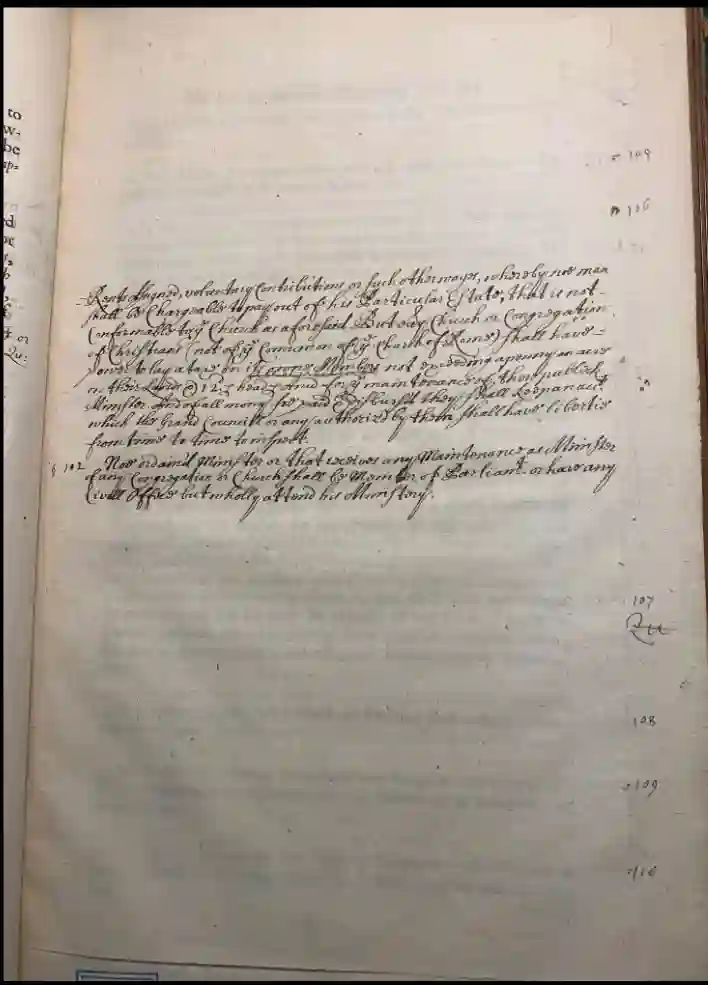
-Rents Assigned, voluntary contributions or such other wayes, whereby noe man
shall be Chargeable to pay out of his Particular Estate, that is not
Conformable to the Church as aforesaid. But [every?] Church or Congregation
of Christians (not of the Comunion of the Church of Rome) shall have
power to lay a taxe on its owne Members not exceeding a penny an acre
on their Lands & 12d per head [?] & And for the maintenance of their publick
Minister. And of all mony soe paid & disburs’d they shall keep an account
which the Grand Councill or any authoriz’d by them shall have libertie
from time to time to inspect.
§102 Noe ordain’d Minister or that receives any Maintenance as Minister
of any Congregation or Church shall be Member of Parliament or have any
Civill Office but wholly attend his Ministery.

19
shall be kept by the publick Register of the Precinct where they
reside.
§.98. 105 The Tune of every ones Subscription and Admittance, shall be Da-
ted in the said Book or religious Record.
§.99. 106 In the Terms of Communion of every Church or Profession, these fol-
lowing shall be three, without which no Agreement or Assembly of
Men, upon pretence of Religion, shall be accounted a Church or Pro-
fession, within these Rules:
I. That there is a GOD.
II. That GOD is publickly to be Worshipped.
III. That it is lawful, and the Duty of every Man, be-
ing thereunto called by those that Govern, to bear Witness to
Truth; and that every Church or Profession shall in their
Terms of Communion set down the external Way whereby they
witness a Truth as in the presence of GOD, whether it be by
laying Hands on, or kissing the Bible, as in the Church of
England, or by holding up the Hand, or any other sensible
way.
§.100. 107 {Qu} No Person above seventeen Years of Age, shall have any benefit
or protection of the Law, or be capable of any place of Profit or
Honour, who is not a Member of some Church or Profession, having
his Name Recorded in some one, and but one religious Record at
once.
§.101. 108 No Person of any other Church or Profession shall disturb or mo-
lest any religious Assembly.
§.102. 109 No Person whatsoever shall speak any thing in their religious As-
sembly, irreverently or seditiously of the Government or Governours, or
State-Matters.
§.103. 110 Any Person Subscribing the Terms of Communion in the Record of
the said Church or Profession before the Precinct Register, and any five

20
Members of the said Church or Profession, shall be thereby made a
Member of the said Church or Profession.
111 §.104. Any Person striking out his own Name out of any religious
Record, or his Name being struck out by any Officer thereunto
authorized by each Church or Profession respectively, shall cease to
be a Member of that Church or Profession.
112 §.105. No man shall use any reproachful, reviling, or abusive Language,
against the Religion of any Church or Profession, that being the cer-
tain way of disturbing the Peace, and of hindring the Conversion of
any to the Truth, by engaging them in Quarrels and Animosities,
to the hatred of the Professors and that Profession, which otherwise
they might be brought to assent to.
113 §.106. Since Charity obliges us to wish well to the Souls of all Men,
and Religion ought to alter nothing in any Man’s Civil Estate or
Right, it shall be lawful for Slaves as well as others, to Enter
themselves, and be of what Church or Profession any of them shall
think best, and thereof be as fully Members as any Freeman. But
yet no Slave shall hereby be exempted from that Civil Dominion his
Master hath over him, but be in all other things in the same State
and Condition he was in before.
114 §.107. Assemblies upon what pretence soever of Religion, not ob-
serving and performing the abovesaid Rules, shall not be
esteemed as Churches, but unlawful Meetings, and be punished as
other Riots.
115 §.108. No Person whatsoever shall disturb, molest or persecute another for
his speculative Opinions in Religion, or his Way of Worship.
116 §.109. Every Freeman of Carolina shall have absolute Power and Au-
thority over his Negro Slaves, of what Opinion or Religion
soever.
117 §.110. No Cause, whether Civil or Criminal, of any Freeman, shall be
Tried in any Court of Judicature, without a Jury of his Peers.
118 §.111. No Person whatsoever shall hold or claim any Land in Carolina
by Purchase or Gift, or otherwise, from the Natives or any other
whatsoever, but meerly from and under the Lords Proprietors, upon
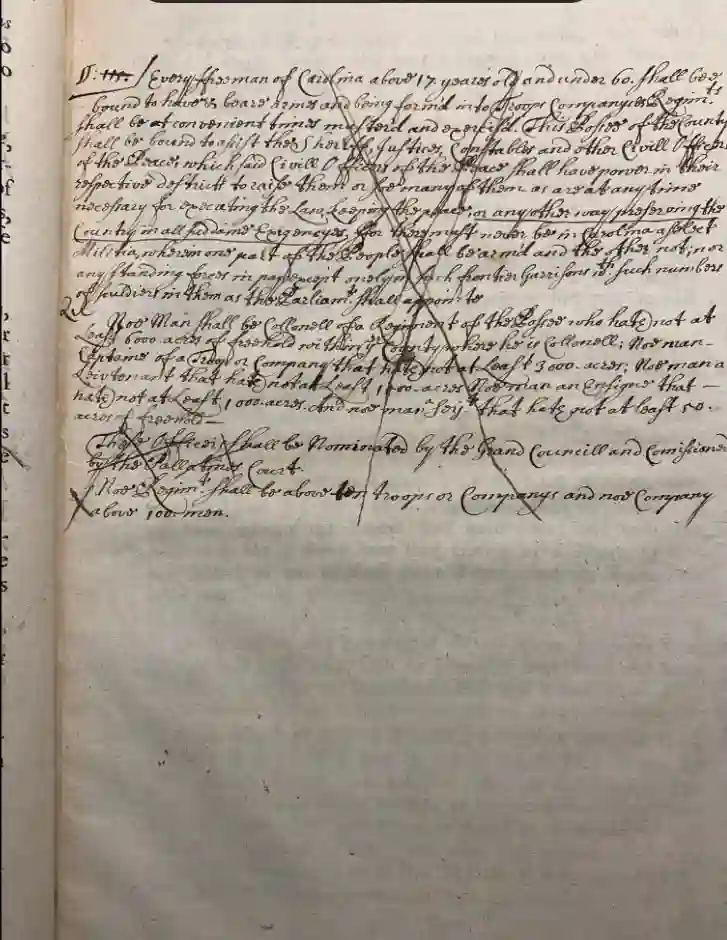
§: 115. Every Freeman of Carolina above 17 yeares old and under 60 shall bee
bound to have & beare armes and being form’d into Troops Companys & Regiments
shall be at convenient times muster’d and exercis’d. This Possee of the County
shall be bound to assist the Sheriff, Justices, Constables and other Civill Officers
of the Peace, which said Civill Officers of the Peace shall have power in their
respective districts to raise them or soe many of them as are at any time
necessary for executing the Law, keeping the peace, or any other way preserving the
Country in all Suddaine Exigencyes, For there must never be in Carolina a Select
Militia, wherein one part of the People shall be arm’d and the other not; nor
any standing forces in pay except onely in such frontier Garrisons with such numbers
of Souldiers in them as the Parliament shall appointe
Qu
Noe Man shall be Collonell of a Regiment of the Possee who hath not at
Least 6000 acres of freehold within the County where he is Collonell; Noe man
Captaine of a Troop or Company that hath not at Least 3000 acres; Noe man a
Leiutenant that hath not at Least 1500 acres Noe man an Ensigne that –
hath not at Least 1000. acres. And noe man a Serjeant that hath not at least 50
acres of freehold –
These Officers shall be Nominated by the Grand Councill and Comissioned
by the Pallatines Court.
Noe Regiment shall be above ten troops or Companys and noe Company
above 100 men.

21
pain of forfeiture of all his Estate, moveable or immoveable, and
perpetual banishment.
§.112. 119 Whosoever shall possess any Freehold in Carolina, upon what
Title or Grant soever, shall at the farthest from and after the
Year One thousand six hundred eighty Nine, pay yearly unto the
Lords Proprietors for each Acre of Land, English Measure, as much
fine Silver as is at this present in one English Peny, or the value
thereof to be as a Chief Rent and Acknowledgment to the Lords Proprie-
tors, their Heirs and Successors for ever; except such persons with
whom the Lords Proprietors have made or shall make some other agreement un-
der their Hands and Seals. And it shall be lawful for the Pala-
tine’s Court by their Officers at any time, to take a new Survey
of any Mans Land, not to out him of any part of his Posses-
sion, but that by such [?] a Survey the just number of Acres he pos-
sesseth may be known, and the Rent thereupon due, may be paid
by him.
§.113. 120 All Wrecks, Mines, Minerals, Quarries of Gemms, and Precious
Stones, with Pearl-fishing, Whale-fishing, and one half of all Amber-
greece, by whomsoever found, shall wholly belong to the Lords
Proprietors.
§.114. 121 All Revenues and Profits belonging to the Lords Proprietors, (ex-
cept for Lands and Rents sold) in common, shall be divided into
ten Parts, whereof the Palatine shall have three, and each Pro-
prietor one; but if the Palatine shall Govern by a Deputy, his De-
puty shall have one of those three Tenths, and the Palatine the
other two Tenths. And all Lands mines or other things whatsoever held in Comon by the
Proprietors shall descend to the Succeeding Proprietors in Common and noe benefit be taken by those [[cut off]] outlive [the? [cut off]] rest by Survivor [sh? [cut off]] an eighth part of [[cut off]] Lands Mines & other [?[cut off]] and things that [wo? [cut off]] in Comon shall [con? [cut off]] the Successour of [? [cut off]] Proprietor that is [? [cut off]] as fully & amply as [[cut off]] Proprietor doe [?] had [?pcut off] ] the same during [his?] time.
§.115. 122 All Inhabitants and Free-men of Carolina above seventeen Years
of Age, and under sixty, shall be bound to bear Arms, and Serve
as Soldiers, whenever the Grand Council shall find it necessary.
§.116. 124 A true Copy of these FUNDAMENTAL CON-
STITUTIONS shall be kept in a great Book by the Re-
gister of every Precinct, to be Subscribed before the said Register. Nor
shall any person of what Condition or Degree soever above seven-
teen Years old, have any Estate or Possession in Carolina, or pro-
tection or benefit of the Law there, who hath not before a Precinct
Register Subscribed these FUNDAMENTAL CONSTI-
TUTIONS in this Form:

22
I A.B. do promise to bear Faith and true Allegiance to our
Soveraign Lord King CHARLES the Second, his
Heirs and Successors; and will be true and faithful to
the Palatine and Lords Proprietors of Carolina, their
Heirs and Successors, and with my utmost power will
defend them, and maintain the Government according to
this Establishment in these FUNDAMENTAL
CONSTITUTIONS. & these
125 §.117. Whatsoever Alien shall in this Form, before any Precinct Register
Subscribe these FUNDAMENTAL CONSTITU-
TUTIONS, shall be thereby Naturalized.
126 §.118. In the same manner shall every Person at his Admittance into
any Office, Subscribe these FUNDAMENTAL CON-
STITUTIONS.
127 §.119. Whosoever by Succession or otherwise shall come to be a Proprie-
tor of Carolina, shall not be admitted to exercise any of the Powers
or Jurisdictions belonging to a Lord Proprietor of the aforesaid Pro-
vince, or receive any of the Revenues or Profits belonging to the
same, until he hath either in England or Carolina Subscribed these
FUNDAMENTAL CONSTITUTIONS in
this Form:
I A.B. do promise to bear Faith and true Allegiance to our
Soveraign Lord King CHARLES the Second, his
Heirs and Successors, and will be true and faithful to my
Brethren the Palatine and Lords Proprietors of Caro-
lina, in defence of their Rights, and with my utmost Pow-
er will maintain the Government according to this Esta-
blishment in these FUNDAMENTAL CON-
STITUTIONS.
{Q} §.120. These FUNDAMENTAL CONSTITUTI-
ONS, in number a hundred and twenty, articles and every part there-
of, shall be and remain the sacred and unalterable Form and Rule
of Government of Carolina for ever. [?] Witness our Hands and Seals,
the Twelfth Day of January, One thousand six hundred Eighty one.
But if [ Editor’s Note: Just these 8 words in Locke’s hand, possibly] Unlesse in the variety of human affaires any future Exigency should require any addition or alteracon to be made in any part of them
these fundamental Constitutions; & in such case Any new Article confirm’d by the hands and
Seales of all the Proprietors all the Members of the Grand Councill, and all the Members
of Parliament two two two Successive Parliaments shall be added to these Fundamental Constitutions
and from thenceforth be esteem’d as apart of them to all intents & purposes.
Witnesse &c./

23
Rules of Precedency.
1. THe Lords Proprietors, the eldest in Age first, and so in order.
2. The eldest Sons of the Lords Proprietors, the eldest in Age first,
and so in order.
3. The Landgraves of the Grand Council, he that hath been longest of
the Grand Council first, and so in order.
4. The Cassiques of the Grand Council, he that hath been longest of the
Grand Council first, and so in order.
5. The seven Commoners of the Grand Council that have been longest
of the Grand Council, he that hath been longest of the Grand Council
first, and so in order.
6. The younger Sons of Proprietors, the eldest first, and so in order.
7. The Landgraves, the eldest in Age first, and so in order.
8. The seven Commoners who next to those before mentioned have been
longest of the Grand Council, he that hath been longest of the Grand
Council first, and so in order.
9. The Cassiques, the eldest in Age first, and so in order.
10. The seven remaining Commoners of the Grand Council, he that hath
been longest of the Grand Council first, and so in order.
11. The Male Line of the Proprietors.
The rest shall be determined by the Chamberlain`s Court.
FINIS.